The History Book Club discussion

This topic is about
The British Are Coming
AMERICAN REVOLUTIONARY WAR
>
SPOTLIGHTED BOOK - THE BRITISH ARE COMING: THE WAR FOR AMERICA, LEXINGTON TO PRINCETON, 1775-1777 (THE REVOLUTION TRILOGY #1) - Week Seven - June 22nd - June 28th, 2020 - Chapters Fifteen and Sixteen (pages 348 - 402) Non Spoiler Thread
This is the reading assignment for this week:
Week Seven: (June 22nd - June 28th)
15. A FIGHT AMONG WOLVES New York, July–August 1776 - page 348
16. A SENTIMENTAL MANNER OF MAKING WAR New York, September 1776 - page 380
Folks, on this thread we can discuss anything in the book up through
page 402.
The thread is open.
Week Seven: (June 22nd - June 28th)
15. A FIGHT AMONG WOLVES New York, July–August 1776 - page 348
16. A SENTIMENTAL MANNER OF MAKING WAR New York, September 1776 - page 380
Folks, on this thread we can discuss anything in the book up through
page 402.
The thread is open.
message 3:
by
Bentley, Group Founder, Leader, Chief
(last edited Jun 22, 2020 03:01AM)
(new)
-
rated it 4 stars
All, I suspect that some of you are trying to catch up. Let me know that and I can always slow down or wait for you. But if I do not know we continue on schedule and I do hope you get caught up.
We expect that members who are reading the book will check in at least once per thread to let us know that they are doing ok or have questions or would like to discuss this or that about the book and the assigned reading. We do put up questions and topics for discussion and we do expect that so you can jump right in and discuss the chapters and readings and have a point of reference.
Our discussions are geared so that you can read and discuss each book leisurely but possibly have a couple of other books on the side.
We want to give everybody a chance to get a good history/nonfiction book completed that they have wanted to read.
So welcome to Week Seven!
We expect that members who are reading the book will check in at least once per thread to let us know that they are doing ok or have questions or would like to discuss this or that about the book and the assigned reading. We do put up questions and topics for discussion and we do expect that so you can jump right in and discuss the chapters and readings and have a point of reference.
Our discussions are geared so that you can read and discuss each book leisurely but possibly have a couple of other books on the side.
We want to give everybody a chance to get a good history/nonfiction book completed that they have wanted to read.
So welcome to Week Seven!
message 4:
by
Bentley, Group Founder, Leader, Chief
(last edited Jun 22, 2020 11:15PM)
(new)
-
rated it 4 stars
And so we begin:
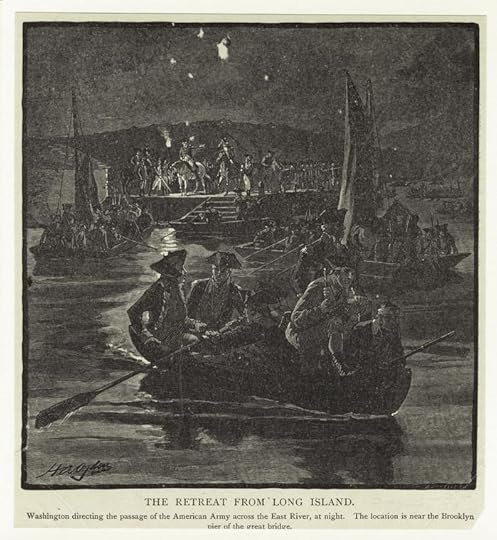
Chapter 15.
A Fight Among Wolves
NEW YORK, JULY–AUGUST 1776
"The fateful news traveled swiftly on the post road from Philadelphia, covering more than ninety miles and crossing five rivers in just a couple of days. Precise copies were then made of the thirteen-hundred-word broadside, titled “A Declaration,” that arrived at the Mortier mansion headquarters, and by Tuesday, July 9,
General Washington was ready for every soldier in his command to hear what Congress had to say. In his orders that morning, after affirming thirty-nine lashes for two convicted deserters, he instructed the army to assemble at six p.m. on various parade grounds, from Governors Island to King’s Bridge.
Each brigade major would then read—“with an audible voice”—the proclamation intended to transform a squalid family brawl into a cause as ambitious and righteous as any in human history.
That evening the commander in chief himself appeared on horseback at the Common with a suite of staff officers, not far from where Sergeant Hickey had tumbled from the scaffold two weeks earlier. Erect and somber, Washington rode into the middle of a hollow square formed by New York and Connecticut regiments while a chirpy throng of civilians ringed the greensward.
A uniformed aide spurred his horse forward; the crowd hushed as he unfolded his script and began to read: “In Congress, July 4, 1776.” Even the most unlettered private recognized that something majestic was in the air.
Source: Atkinson, Rick. The British Are Coming (The Revolution Trilogy) (p. 348). Henry Holt and Co.. Kindle Edition
Discussion Topics and Questions:
1. How did George Washington think that he was going to transform his men from a ragtag bunch of colonists into an ambitious and righteous army who would have a cause to fight for?
2. Little did these men know how much they were witnessing history and being a part of the launch of a brand new country and experiment. How noble is the Declaration of Independence and which segments of the document move you the most? What do these words mean to you?
3. Many folks think that we are a democracy but we are a republic. How does a republic derive its power?
4. The fact that at least a third of the delegates who would sign the Declaration were slave owners and the fact that the author of the document - Thomas Jefferson had 200 was according to Atkinson a "moral catastrophe". What was incongruent with the doctrine and the reality? How did Edmund S. Morgan explain the inequities?
5. Why do groups tear down statues and try to negate history? What was the significance of a rambunctious crowd who were also vandals destroying the statue of George III?
6. What was the answer to the Declaration of Independence that General Howe gave the colonists on Friday afternoon, July 12th?
7. How did Washington lose New York, Long Island and the Hudson as well as losing half of his artillery. Why was this a major miscalculation on the part of Washington and how did this happen? What were your thoughts about the retreat?
8. How impossible a situation was defending the colonists' positions in New York City and Long Island (islands surrounded by water) without a Navy? The British had a Navy and were bringing it and a massive number of troops - and they were surrounding the island with war ships. What could Washington have done differently without a Navy?
9. When Sir William Howe (General of the Army) had arrived - he had arrived without all of his ships and he would have to wait another two months for them to arrive - he housed himself for the duration on Staten Island. What could Washington have done - which he did not do - during this time period?
10. Washington had problems forging a "united spirit" among his troops. His militiamen came from various states and parts of the country and they recognized each other as their group (state) versus anything called "America" and there was a lot of rivalry and conflicts between the groups. How did Washington try to forge a new country's identity?
11. According to John Keegan (British historian) in the PBS special I added about the Battle of Long Island - "The real problem was that the British had not treated the colonists officers as gentlemen even "before the war" when they had been "provincial officers". It has been said that if only the British had made George Washington a regular colonel of the armed forces of the Crown - he wouldn't have been a Revolutionary at all. He might have been fighting energetically to put the rebellion down." What do you think of Keegan's assessment of the lack of respect of the British towards the American officers and that of George Washington?
12. Despite George Washington and his men being outnumbered two to one and the fact that they did not have a Navy - were there any bright spots involving the Battle of Long Island and/or the retreat?
13. Keegan in the PBS special indicates "that even at 300 yards there was no way of hitting anything" - unless you bunched your men up together densely and "in order" and then marched them up with the "officers up front" and then "they did fire upon each other at very close range indeed".
Keegan stated that: "During that time period, a man firing at another 100 yards away had no chance of hitting anyone or anything; the ball might go anywhere - so the only way that you could be certain of inflicting casualties on the enemy was to mass your men as closely as possible together. So both sides massed up into compact clumps and fired at each other - each hoping that the other would run away."
"Once you would have loaded for the first volley - returned your musket and reloaded - the noise was such you couldn't hear anything - you would be very lucky if you could even hear a drum beat and that is why they used drums for commands once the volleying began.
It was then men firing at will and the soldiers just kept firing unless you heard a drum beat or someone yelling in your ear - cease fire. There was no organization after about the third volley."
What do you think of the description of the troops and what occurred after the fighting started? Hard to imagine a worst place to be? How difficult was it to wage war in these circumstances? How disastrous must have been the injuries that these men on both sides suffered?
14. Not knowing the topography - the Americans and George Washington left the Jamaica Pass unguarded and that was their Achilles Heel - a very grave error. General Howe had local Tories guiding him and they found out that the Jamaica Pass on the America's left was virtually unguarded. The Americans not knowing the topography just slipped up and left the Jamaica Pass unguarded. So keeping the Americans occupied in front - another British group slipped through the Jamaica Pass and to the left (on the side) and also came up behind (the American's rear) and then they had the Americans pinned with nowhere to go. The Americans realizing the peril that they found themselves in - just broke and ran. And they only had one escape route - through the Gowanus Marsh.
15. The Battle of Brooklyn and the brave men of the 1st Maryland Regiment changed the course of the war when they holed themselves up so that Washington and his men could evacuate. 256 of about 400 brave men would die. 100 would be taken prisoner and only about 10 ever returning to the American lines. How was Washington responsible for this grave error? And why are these brave men buried at Third and Ninth in Brooklyn under a road or a vacant lot with no memoriam? What would have happened if these brave men did not hold their ground?
16. Did you know that the Battle of Long Island (also known as the Battle of Brooklyn) was the largest battle of the American Revolution with roughly 50,000 men engaged (combined - both sides)? And did you know that it was the largest naval landing until D Day in 1942 (World War II)?
17. Cornwallis offered Stirling high praise later saying, “General Stirling fought like a wolf.” What did Cornwallis mean? In fact, Atkinson titled this chapter - A Fight Among Wolves.
18. There has been much conjecture about who or what was at fault for the disaster at the Battle of Long Island (Battle of Brooklyn). Some say it was that the Americans were outnumbered at least 2 to 1 - others say that the Americans did not have a navy and it would be impossible to defend New York against the powerful British Navy; others say that Greene got sick and Sullivan and Putnam were not used to the topography of their assumed command - but in the final analysis - the fault lies with Washington and his lack of experience in a battle of this magnitude.
The American Battlefield Trust explained it this way: "As was typical of Washington’s style of leadership early in the war he failed to reconnoiter his positions and tactically left his flanks unprotected. This would be his army’s undoing at Brooklyn. Loyalists in the area tipped off British commander Henry Clinton that one of the passes that led to Gowanus and Brooklyn Heights was lightly defended by only five members of the local American militia.
What is your take about Washington's style of leadership early in the war?

Chapter 15.
A Fight Among Wolves
NEW YORK, JULY–AUGUST 1776
"The fateful news traveled swiftly on the post road from Philadelphia, covering more than ninety miles and crossing five rivers in just a couple of days. Precise copies were then made of the thirteen-hundred-word broadside, titled “A Declaration,” that arrived at the Mortier mansion headquarters, and by Tuesday, July 9,
General Washington was ready for every soldier in his command to hear what Congress had to say. In his orders that morning, after affirming thirty-nine lashes for two convicted deserters, he instructed the army to assemble at six p.m. on various parade grounds, from Governors Island to King’s Bridge.
Each brigade major would then read—“with an audible voice”—the proclamation intended to transform a squalid family brawl into a cause as ambitious and righteous as any in human history.
That evening the commander in chief himself appeared on horseback at the Common with a suite of staff officers, not far from where Sergeant Hickey had tumbled from the scaffold two weeks earlier. Erect and somber, Washington rode into the middle of a hollow square formed by New York and Connecticut regiments while a chirpy throng of civilians ringed the greensward.
A uniformed aide spurred his horse forward; the crowd hushed as he unfolded his script and began to read: “In Congress, July 4, 1776.” Even the most unlettered private recognized that something majestic was in the air.
We hold these truths to be self-evident, that all men are created equal, that they are endowed by their Creator with certain unalienable rights, that among these are life, liberty, and the pursuit of happiness. That to secure these rights, governments are instituted among men, deriving their just powers from the consent of the governed.
Source: Atkinson, Rick. The British Are Coming (The Revolution Trilogy) (p. 348). Henry Holt and Co.. Kindle Edition
Discussion Topics and Questions:
1. How did George Washington think that he was going to transform his men from a ragtag bunch of colonists into an ambitious and righteous army who would have a cause to fight for?
2. Little did these men know how much they were witnessing history and being a part of the launch of a brand new country and experiment. How noble is the Declaration of Independence and which segments of the document move you the most? What do these words mean to you?
3. Many folks think that we are a democracy but we are a republic. How does a republic derive its power?
4. The fact that at least a third of the delegates who would sign the Declaration were slave owners and the fact that the author of the document - Thomas Jefferson had 200 was according to Atkinson a "moral catastrophe". What was incongruent with the doctrine and the reality? How did Edmund S. Morgan explain the inequities?
5. Why do groups tear down statues and try to negate history? What was the significance of a rambunctious crowd who were also vandals destroying the statue of George III?
6. What was the answer to the Declaration of Independence that General Howe gave the colonists on Friday afternoon, July 12th?
7. How did Washington lose New York, Long Island and the Hudson as well as losing half of his artillery. Why was this a major miscalculation on the part of Washington and how did this happen? What were your thoughts about the retreat?
8. How impossible a situation was defending the colonists' positions in New York City and Long Island (islands surrounded by water) without a Navy? The British had a Navy and were bringing it and a massive number of troops - and they were surrounding the island with war ships. What could Washington have done differently without a Navy?
9. When Sir William Howe (General of the Army) had arrived - he had arrived without all of his ships and he would have to wait another two months for them to arrive - he housed himself for the duration on Staten Island. What could Washington have done - which he did not do - during this time period?
10. Washington had problems forging a "united spirit" among his troops. His militiamen came from various states and parts of the country and they recognized each other as their group (state) versus anything called "America" and there was a lot of rivalry and conflicts between the groups. How did Washington try to forge a new country's identity?
11. According to John Keegan (British historian) in the PBS special I added about the Battle of Long Island - "The real problem was that the British had not treated the colonists officers as gentlemen even "before the war" when they had been "provincial officers". It has been said that if only the British had made George Washington a regular colonel of the armed forces of the Crown - he wouldn't have been a Revolutionary at all. He might have been fighting energetically to put the rebellion down." What do you think of Keegan's assessment of the lack of respect of the British towards the American officers and that of George Washington?
12. Despite George Washington and his men being outnumbered two to one and the fact that they did not have a Navy - were there any bright spots involving the Battle of Long Island and/or the retreat?
13. Keegan in the PBS special indicates "that even at 300 yards there was no way of hitting anything" - unless you bunched your men up together densely and "in order" and then marched them up with the "officers up front" and then "they did fire upon each other at very close range indeed".
Keegan stated that: "During that time period, a man firing at another 100 yards away had no chance of hitting anyone or anything; the ball might go anywhere - so the only way that you could be certain of inflicting casualties on the enemy was to mass your men as closely as possible together. So both sides massed up into compact clumps and fired at each other - each hoping that the other would run away."
"Once you would have loaded for the first volley - returned your musket and reloaded - the noise was such you couldn't hear anything - you would be very lucky if you could even hear a drum beat and that is why they used drums for commands once the volleying began.
It was then men firing at will and the soldiers just kept firing unless you heard a drum beat or someone yelling in your ear - cease fire. There was no organization after about the third volley."
What do you think of the description of the troops and what occurred after the fighting started? Hard to imagine a worst place to be? How difficult was it to wage war in these circumstances? How disastrous must have been the injuries that these men on both sides suffered?
14. Not knowing the topography - the Americans and George Washington left the Jamaica Pass unguarded and that was their Achilles Heel - a very grave error. General Howe had local Tories guiding him and they found out that the Jamaica Pass on the America's left was virtually unguarded. The Americans not knowing the topography just slipped up and left the Jamaica Pass unguarded. So keeping the Americans occupied in front - another British group slipped through the Jamaica Pass and to the left (on the side) and also came up behind (the American's rear) and then they had the Americans pinned with nowhere to go. The Americans realizing the peril that they found themselves in - just broke and ran. And they only had one escape route - through the Gowanus Marsh.
15. The Battle of Brooklyn and the brave men of the 1st Maryland Regiment changed the course of the war when they holed themselves up so that Washington and his men could evacuate. 256 of about 400 brave men would die. 100 would be taken prisoner and only about 10 ever returning to the American lines. How was Washington responsible for this grave error? And why are these brave men buried at Third and Ninth in Brooklyn under a road or a vacant lot with no memoriam? What would have happened if these brave men did not hold their ground?
16. Did you know that the Battle of Long Island (also known as the Battle of Brooklyn) was the largest battle of the American Revolution with roughly 50,000 men engaged (combined - both sides)? And did you know that it was the largest naval landing until D Day in 1942 (World War II)?
17. Cornwallis offered Stirling high praise later saying, “General Stirling fought like a wolf.” What did Cornwallis mean? In fact, Atkinson titled this chapter - A Fight Among Wolves.
18. There has been much conjecture about who or what was at fault for the disaster at the Battle of Long Island (Battle of Brooklyn). Some say it was that the Americans were outnumbered at least 2 to 1 - others say that the Americans did not have a navy and it would be impossible to defend New York against the powerful British Navy; others say that Greene got sick and Sullivan and Putnam were not used to the topography of their assumed command - but in the final analysis - the fault lies with Washington and his lack of experience in a battle of this magnitude.
The American Battlefield Trust explained it this way: "As was typical of Washington’s style of leadership early in the war he failed to reconnoiter his positions and tactically left his flanks unprotected. This would be his army’s undoing at Brooklyn. Loyalists in the area tipped off British commander Henry Clinton that one of the passes that led to Gowanus and Brooklyn Heights was lightly defended by only five members of the local American militia.
What is your take about Washington's style of leadership early in the war?
message 5:
by
Bentley, Group Founder, Leader, Chief
(last edited Jun 22, 2020 09:57PM)
(new)
-
rated it 4 stars
Chapter Overviews and Summaries

August 1776: Council of War in the house of Mr Philip Livingstone in Brooklyn, after the Battle of Long Island. (Photo by Three Lions/Getty Images)
15. A FIGHT AMONG WOLVES
New York,
July–August 1776
George Washington returned from Philadelphia and wanted every soldier in his command to hear the declaration. His hope was that this declaration would transform his army because they now would have an ambitious and righteous cause to fight for.
The Declaration of Independence was read - a document written by Thomas Jefferson who wrote that all men are created equal, and that they are endowed by their Creator with certain unalienable rights, and that among these are life, liberty, and the pursuit of happiness. Jefferson claimed later that this was intended to be an expression of the American mind.
A third of the delegates who would sign the Declaration were slave owners and Jefferson had two hundred - so you can see due to their culture - there was a disconnect. But as Edmund S. Morgan would write: "The creed of equality did not give men equality, but invited them to claim it, invited them, not to know their place and keep it, but to seek and demand a better place." This chapter is quite timely in terms of current events.
After the decapitation of the George III statue, General Howe had an answer to the Declaration of Independence, and he sent it on Friday afternoon, July 12th. Washington tried to figure out what would be the Howe brothers next move - would the British continue to push up the Hudson, perhaps in hopes of joining Carleton's force from Canada or would they thread the East River to Long Island Sound, landing behind the American fortifications in New York?
Or would they launch amphibious landings on both Manhattan and Long Island?
In the end, Washington misjudged the strategy of the British and Howe chose the Battle of Long Island.
16. A SENTIMENTAL MANNER OF MAKING WAR
New York
September 1776
Benjamin Franklin, John Adams, and Edward Rutledge were called to a conference with Lord Howe in Staten Island. Howe wanted to discuss putting a stop to the calamities of war.
Franklin retorted that "Forces have been sent out and towns have been burnt. We cannot now expect happiness under the domination of Great Britain. All former attachments have been obliterated." Howe was gentlemanly and the three left.
Howe felt deflated and wrote Germain that the colonies were not going to accede to any peace or alliance - but only as free and independent states.
In the meantime, Washington's troops voted to evacuate New York City and then retracting to Harlem Heights and going further to the high ground at Fort Washington. Washington ordered the town stripped and this retreat ended with the Battle of Kip's Bay and Harlem Heights.
Left behind in a rush were over half of Washington's heavy artillery- 64 guns - including 15 mounted 32 pounders and twelve thousand round shot - enough to replenish the dwindling British naval ammunition stocks.
Washington had lost another battle, most of another island and his first city. This was a rout and 50 were killed and 371 captured. New York burned.

August 1776: Council of War in the house of Mr Philip Livingstone in Brooklyn, after the Battle of Long Island. (Photo by Three Lions/Getty Images)
15. A FIGHT AMONG WOLVES
New York,
July–August 1776
George Washington returned from Philadelphia and wanted every soldier in his command to hear the declaration. His hope was that this declaration would transform his army because they now would have an ambitious and righteous cause to fight for.
The Declaration of Independence was read - a document written by Thomas Jefferson who wrote that all men are created equal, and that they are endowed by their Creator with certain unalienable rights, and that among these are life, liberty, and the pursuit of happiness. Jefferson claimed later that this was intended to be an expression of the American mind.
A third of the delegates who would sign the Declaration were slave owners and Jefferson had two hundred - so you can see due to their culture - there was a disconnect. But as Edmund S. Morgan would write: "The creed of equality did not give men equality, but invited them to claim it, invited them, not to know their place and keep it, but to seek and demand a better place." This chapter is quite timely in terms of current events.
After the decapitation of the George III statue, General Howe had an answer to the Declaration of Independence, and he sent it on Friday afternoon, July 12th. Washington tried to figure out what would be the Howe brothers next move - would the British continue to push up the Hudson, perhaps in hopes of joining Carleton's force from Canada or would they thread the East River to Long Island Sound, landing behind the American fortifications in New York?
Or would they launch amphibious landings on both Manhattan and Long Island?
In the end, Washington misjudged the strategy of the British and Howe chose the Battle of Long Island.
16. A SENTIMENTAL MANNER OF MAKING WAR
New York
September 1776
Benjamin Franklin, John Adams, and Edward Rutledge were called to a conference with Lord Howe in Staten Island. Howe wanted to discuss putting a stop to the calamities of war.
Franklin retorted that "Forces have been sent out and towns have been burnt. We cannot now expect happiness under the domination of Great Britain. All former attachments have been obliterated." Howe was gentlemanly and the three left.
Howe felt deflated and wrote Germain that the colonies were not going to accede to any peace or alliance - but only as free and independent states.
In the meantime, Washington's troops voted to evacuate New York City and then retracting to Harlem Heights and going further to the high ground at Fort Washington. Washington ordered the town stripped and this retreat ended with the Battle of Kip's Bay and Harlem Heights.
Left behind in a rush were over half of Washington's heavy artillery- 64 guns - including 15 mounted 32 pounders and twelve thousand round shot - enough to replenish the dwindling British naval ammunition stocks.
Washington had lost another battle, most of another island and his first city. This was a rout and 50 were killed and 371 captured. New York burned.
The Declaration of Independence
IN CONGRESS, JULY 4, 1776
The unanimous Declaration of the thirteen united States of America
When in the Course of human events it becomes necessary for one people to dissolve the political bands which have connected them with another and to assume among the powers of the earth, the separate and equal station to which the Laws of Nature and of Nature's God entitle them, a decent respect to the opinions of mankind requires that they should declare the causes which impel them to the separation.
We hold these truths to be self-evident, that all men are created equal, that they are endowed by their Creator with certain unalienable Rights, that among these are Life, Liberty and the pursuit of Happiness. — That to secure these rights, Governments are instituted among Men, deriving their just powers from the consent of the governed, — That whenever any Form of Government becomes destructive of these ends, it is the Right of the People to alter or to abolish it, and to institute new Government, laying its foundation on such principles and organizing its powers in such form, as to them shall seem most likely to effect their Safety and Happiness. Prudence, indeed, will dictate that Governments long established should not be changed for light and transient causes; and accordingly all experience hath shewn that mankind are more disposed to suffer, while evils are sufferable than to right themselves by abolishing the forms to which they are accustomed. But when a long train of abuses and usurpations, pursuing invariably the same Object evinces a design to reduce them under absolute Despotism, it is their right, it is their duty, to throw off such Government, and to provide new Guards for their future security. — Such has been the patient sufferance of these Colonies; and such is now the necessity which constrains them to alter their former Systems of Government. The history of the present King of Great Britain is a history of repeated injuries and usurpations, all having in direct object the establishment of an absolute Tyranny over these States. To prove this, let Facts be submitted to a candid world.
He has refused his Assent to Laws, the most wholesome and necessary for the public good.
He has forbidden his Governors to pass Laws of immediate and pressing importance, unless suspended in their operation till his Assent should be obtained; and when so suspended, he has utterly neglected to attend to them.
He has refused to pass other Laws for the accommodation of large districts of people, unless those people would relinquish the right of Representation in the Legislature, a right inestimable to them and formidable to tyrants only.
He has called together legislative bodies at places unusual, uncomfortable, and distant from the depository of their Public Records, for the sole purpose of fatiguing them into compliance with his measures.
He has dissolved Representative Houses repeatedly, for opposing with manly firmness his invasions on the rights of the people.
He has refused for a long time, after such dissolutions, to cause others to be elected, whereby the Legislative Powers, incapable of Annihilation, have returned to the People at large for their exercise; the State remaining in the mean time exposed to all the dangers of invasion from without, and convulsions within.
He has endeavoured to prevent the population of these States; for that purpose obstructing the Laws for Naturalization of Foreigners; refusing to pass others to encourage their migrations hither, and raising the conditions of new Appropriations of Lands.
He has obstructed the Administration of Justice by refusing his Assent to Laws for establishing Judiciary Powers.
He has made Judges dependent on his Will alone for the tenure of their offices, and the amount and payment of their salaries.
He has erected a multitude of New Offices, and sent hither swarms of Officers to harass our people and eat out their substance.
He has kept among us, in times of peace, Standing Armies without the Consent of our legislatures.
He has affected to render the Military independent of and superior to the Civil Power.
He has combined with others to subject us to a jurisdiction foreign to our constitution, and unacknowledged by our laws; giving his Assent to their Acts of pretended Legislation:
For quartering large bodies of armed troops among us:
For protecting them, by a mock Trial from punishment for any Murders which they should commit on the Inhabitants of these States:
For cutting off our Trade with all parts of the world:
For imposing Taxes on us without our Consent:
For depriving us in many cases, of the benefit of Trial by Jury:
For transporting us beyond Seas to be tried for pretended offences:
For abolishing the free System of English Laws in a neighbouring Province, establishing therein an Arbitrary government, and enlarging its Boundaries so as to render it at once an example and fit instrument for introducing the same absolute rule into these Colonies
For taking away our Charters, abolishing our most valuable Laws and altering fundamentally the Forms of our Governments:
For suspending our own Legislatures, and declaring themselves invested with power to legislate for us in all cases whatsoever.
He has abdicated Government here, by declaring us out of his Protection and waging War against us.
He has plundered our seas, ravaged our coasts, burnt our towns, and destroyed the lives of our people.
He is at this time transporting large Armies of foreign Mercenaries to compleat the works of death, desolation, and tyranny, already begun with circumstances of Cruelty & Perfidy scarcely paralleled in the most barbarous ages, and totally unworthy the Head of a civilized nation.
He has constrained our fellow Citizens taken Captive on the high Seas to bear Arms against their Country, to become the executioners of their friends and Brethren, or to fall themselves by their Hands.
He has excited domestic insurrections amongst us, and has endeavoured to bring on the inhabitants of our frontiers, the merciless Indian Savages whose known rule of warfare, is an undistinguished destruction of all ages, sexes and conditions.
In every stage of these Oppressions We have Petitioned for Redress in the most humble terms: Our repeated Petitions have been answered only by repeated injury. A Prince, whose character is thus marked by every act which may define a Tyrant, is unfit to be the ruler of a free people.
Nor have We been wanting in attentions to our British brethren. We have warned them from time to time of attempts by their legislature to extend an unwarrantable jurisdiction over us. We have reminded them of the circumstances of our emigration and settlement here. We have appealed to their native justice and magnanimity, and we have conjured them by the ties of our common kindred to disavow these usurpations, which would inevitably interrupt our connections and correspondence. They too have been deaf to the voice of justice and of consanguinity. We must, therefore, acquiesce in the necessity, which denounces our Separation, and hold them, as we hold the rest of mankind, Enemies in War, in Peace Friends.
We, therefore, the Representatives of the united States of America, in General Congress, Assembled, appealing to the Supreme Judge of the world for the rectitude of our intentions, do, in the Name, and by Authority of the good People of these Colonies, solemnly publish and declare, That these united Colonies are, and of Right ought to be Free and Independent States, that they are Absolved from all Allegiance to the British Crown, and that all political connection between them and the State of Great Britain, is and ought to be totally dissolved; and that as Free and Independent States, they have full Power to levy War, conclude Peace, contract Alliances, establish Commerce, and to do all other Acts and Things which Independent States may of right do. — And for the support of this Declaration, with a firm reliance on the protection of Divine Providence, we mutually pledge to each other our Lives, our Fortunes, and our sacred Honor.
New Hampshire:
Josiah Bartlett, William Whipple, Matthew Thornton
Massachusetts:
John Hancock, Samuel Adams, John Adams, Robert Treat Paine, Elbridge Gerry
Rhode Island:
Stephen Hopkins, William Ellery
Connecticut:
Roger Sherman, Samuel Huntington, William Williams, Oliver Wolcott
New York:
William Floyd, Philip Livingston, Francis Lewis, Lewis Morris
New Jersey:
Richard Stockton, John Witherspoon, Francis Hopkinson, John Hart, Abraham Clark
Pennsylvania:
Robert Morris, Benjamin Rush, Benjamin Franklin, John Morton, George Clymer, James Smith, George Taylor, James Wilson, George Ross
Delaware:
Caesar Rodney, George Read, Thomas McKean
Maryland:
Samuel Chase, William Paca, Thomas Stone, Charles Carroll of Carrollton
Virginia:
George Wythe, Richard Henry Lee, Thomas Jefferson, Benjamin Harrison, Thomas Nelson, Jr., Francis Lightfoot Lee, Carter Braxton
North Carolina:
William Hooper, Joseph Hewes, John Penn
South Carolina:
Edward Rutledge, Thomas Heyward, Jr., Thomas Lynch, Jr., Arthur Middleton
Georgia:
Button Gwinnett, Lyman Hall, George Walton
Source: USHistory.org
IN CONGRESS, JULY 4, 1776
The unanimous Declaration of the thirteen united States of America
When in the Course of human events it becomes necessary for one people to dissolve the political bands which have connected them with another and to assume among the powers of the earth, the separate and equal station to which the Laws of Nature and of Nature's God entitle them, a decent respect to the opinions of mankind requires that they should declare the causes which impel them to the separation.
We hold these truths to be self-evident, that all men are created equal, that they are endowed by their Creator with certain unalienable Rights, that among these are Life, Liberty and the pursuit of Happiness. — That to secure these rights, Governments are instituted among Men, deriving their just powers from the consent of the governed, — That whenever any Form of Government becomes destructive of these ends, it is the Right of the People to alter or to abolish it, and to institute new Government, laying its foundation on such principles and organizing its powers in such form, as to them shall seem most likely to effect their Safety and Happiness. Prudence, indeed, will dictate that Governments long established should not be changed for light and transient causes; and accordingly all experience hath shewn that mankind are more disposed to suffer, while evils are sufferable than to right themselves by abolishing the forms to which they are accustomed. But when a long train of abuses and usurpations, pursuing invariably the same Object evinces a design to reduce them under absolute Despotism, it is their right, it is their duty, to throw off such Government, and to provide new Guards for their future security. — Such has been the patient sufferance of these Colonies; and such is now the necessity which constrains them to alter their former Systems of Government. The history of the present King of Great Britain is a history of repeated injuries and usurpations, all having in direct object the establishment of an absolute Tyranny over these States. To prove this, let Facts be submitted to a candid world.
He has refused his Assent to Laws, the most wholesome and necessary for the public good.
He has forbidden his Governors to pass Laws of immediate and pressing importance, unless suspended in their operation till his Assent should be obtained; and when so suspended, he has utterly neglected to attend to them.
He has refused to pass other Laws for the accommodation of large districts of people, unless those people would relinquish the right of Representation in the Legislature, a right inestimable to them and formidable to tyrants only.
He has called together legislative bodies at places unusual, uncomfortable, and distant from the depository of their Public Records, for the sole purpose of fatiguing them into compliance with his measures.
He has dissolved Representative Houses repeatedly, for opposing with manly firmness his invasions on the rights of the people.
He has refused for a long time, after such dissolutions, to cause others to be elected, whereby the Legislative Powers, incapable of Annihilation, have returned to the People at large for their exercise; the State remaining in the mean time exposed to all the dangers of invasion from without, and convulsions within.
He has endeavoured to prevent the population of these States; for that purpose obstructing the Laws for Naturalization of Foreigners; refusing to pass others to encourage their migrations hither, and raising the conditions of new Appropriations of Lands.
He has obstructed the Administration of Justice by refusing his Assent to Laws for establishing Judiciary Powers.
He has made Judges dependent on his Will alone for the tenure of their offices, and the amount and payment of their salaries.
He has erected a multitude of New Offices, and sent hither swarms of Officers to harass our people and eat out their substance.
He has kept among us, in times of peace, Standing Armies without the Consent of our legislatures.
He has affected to render the Military independent of and superior to the Civil Power.
He has combined with others to subject us to a jurisdiction foreign to our constitution, and unacknowledged by our laws; giving his Assent to their Acts of pretended Legislation:
For quartering large bodies of armed troops among us:
For protecting them, by a mock Trial from punishment for any Murders which they should commit on the Inhabitants of these States:
For cutting off our Trade with all parts of the world:
For imposing Taxes on us without our Consent:
For depriving us in many cases, of the benefit of Trial by Jury:
For transporting us beyond Seas to be tried for pretended offences:
For abolishing the free System of English Laws in a neighbouring Province, establishing therein an Arbitrary government, and enlarging its Boundaries so as to render it at once an example and fit instrument for introducing the same absolute rule into these Colonies
For taking away our Charters, abolishing our most valuable Laws and altering fundamentally the Forms of our Governments:
For suspending our own Legislatures, and declaring themselves invested with power to legislate for us in all cases whatsoever.
He has abdicated Government here, by declaring us out of his Protection and waging War against us.
He has plundered our seas, ravaged our coasts, burnt our towns, and destroyed the lives of our people.
He is at this time transporting large Armies of foreign Mercenaries to compleat the works of death, desolation, and tyranny, already begun with circumstances of Cruelty & Perfidy scarcely paralleled in the most barbarous ages, and totally unworthy the Head of a civilized nation.
He has constrained our fellow Citizens taken Captive on the high Seas to bear Arms against their Country, to become the executioners of their friends and Brethren, or to fall themselves by their Hands.
He has excited domestic insurrections amongst us, and has endeavoured to bring on the inhabitants of our frontiers, the merciless Indian Savages whose known rule of warfare, is an undistinguished destruction of all ages, sexes and conditions.
In every stage of these Oppressions We have Petitioned for Redress in the most humble terms: Our repeated Petitions have been answered only by repeated injury. A Prince, whose character is thus marked by every act which may define a Tyrant, is unfit to be the ruler of a free people.
Nor have We been wanting in attentions to our British brethren. We have warned them from time to time of attempts by their legislature to extend an unwarrantable jurisdiction over us. We have reminded them of the circumstances of our emigration and settlement here. We have appealed to their native justice and magnanimity, and we have conjured them by the ties of our common kindred to disavow these usurpations, which would inevitably interrupt our connections and correspondence. They too have been deaf to the voice of justice and of consanguinity. We must, therefore, acquiesce in the necessity, which denounces our Separation, and hold them, as we hold the rest of mankind, Enemies in War, in Peace Friends.
We, therefore, the Representatives of the united States of America, in General Congress, Assembled, appealing to the Supreme Judge of the world for the rectitude of our intentions, do, in the Name, and by Authority of the good People of these Colonies, solemnly publish and declare, That these united Colonies are, and of Right ought to be Free and Independent States, that they are Absolved from all Allegiance to the British Crown, and that all political connection between them and the State of Great Britain, is and ought to be totally dissolved; and that as Free and Independent States, they have full Power to levy War, conclude Peace, contract Alliances, establish Commerce, and to do all other Acts and Things which Independent States may of right do. — And for the support of this Declaration, with a firm reliance on the protection of Divine Providence, we mutually pledge to each other our Lives, our Fortunes, and our sacred Honor.
New Hampshire:
Josiah Bartlett, William Whipple, Matthew Thornton
Massachusetts:
John Hancock, Samuel Adams, John Adams, Robert Treat Paine, Elbridge Gerry
Rhode Island:
Stephen Hopkins, William Ellery
Connecticut:
Roger Sherman, Samuel Huntington, William Williams, Oliver Wolcott
New York:
William Floyd, Philip Livingston, Francis Lewis, Lewis Morris
New Jersey:
Richard Stockton, John Witherspoon, Francis Hopkinson, John Hart, Abraham Clark
Pennsylvania:
Robert Morris, Benjamin Rush, Benjamin Franklin, John Morton, George Clymer, James Smith, George Taylor, James Wilson, George Ross
Delaware:
Caesar Rodney, George Read, Thomas McKean
Maryland:
Samuel Chase, William Paca, Thomas Stone, Charles Carroll of Carrollton
Virginia:
George Wythe, Richard Henry Lee, Thomas Jefferson, Benjamin Harrison, Thomas Nelson, Jr., Francis Lightfoot Lee, Carter Braxton
North Carolina:
William Hooper, Joseph Hewes, John Penn
South Carolina:
Edward Rutledge, Thomas Heyward, Jr., Thomas Lynch, Jr., Arthur Middleton
Georgia:
Button Gwinnett, Lyman Hall, George Walton
Source: USHistory.org
Psalm 80 - KIng James Bible Version
To the chief Musician upon ShoshannimEduth, A Psalm of Asaph.
Give ear, O Shepherd of Israel, thou that leadest Joseph like a flock; thou that dwellest between the cherubims, shine forth.
Before Ephraim and Benjamin and Manasseh stir up thy strength, and come and save us.
Turn us again, O God, and cause thy face to shine; and we shall be saved.
O LORD God of hosts, how long wilt thou be angry against the prayer of thy people?
Thou feedest them with the bread of tears; and givest them tears to drink in great measure.
Thou makest us a strife unto our neighbours: and our enemies laugh among themselves.
Turn us again, O God of hosts, and cause thy face to shine; and we shall be saved.
Thou hast brought a vine out of Egypt: thou hast cast out the heathen, and planted it.
Thou preparedst room before it, and didst cause it to take deep root, and it filled the land.
The hills were covered with the shadow of it, and the boughs thereof were like the goodly cedars.
She sent out her boughs unto the sea, and her branches unto the river.
Why hast thou then broken down her hedges, so that all they which pass by the way do pluck her?
The boar out of the wood doth waste it, and the wild beast of the field doth devour it.
Return, we beseech thee, O God of hosts: look down from heaven, and behold, and visit this vine;
And the vineyard which thy right hand hath planted, and the branch that thou madest strong for thyself.
It is burned with fire, it is cut down: they perish at the rebuke of thy countenance.
Let thy hand be upon the man of thy right hand, upon the son of man whom thou madest strong for thyself.
So will not we go back from thee: quicken us, and we will call upon thy name.
Turn us again, O LORD God of hosts, cause thy face to shine; and we shall be saved.
To the chief Musician upon ShoshannimEduth, A Psalm of Asaph.
Give ear, O Shepherd of Israel, thou that leadest Joseph like a flock; thou that dwellest between the cherubims, shine forth.
Before Ephraim and Benjamin and Manasseh stir up thy strength, and come and save us.
Turn us again, O God, and cause thy face to shine; and we shall be saved.
O LORD God of hosts, how long wilt thou be angry against the prayer of thy people?
Thou feedest them with the bread of tears; and givest them tears to drink in great measure.
Thou makest us a strife unto our neighbours: and our enemies laugh among themselves.
Turn us again, O God of hosts, and cause thy face to shine; and we shall be saved.
Thou hast brought a vine out of Egypt: thou hast cast out the heathen, and planted it.
Thou preparedst room before it, and didst cause it to take deep root, and it filled the land.
The hills were covered with the shadow of it, and the boughs thereof were like the goodly cedars.
She sent out her boughs unto the sea, and her branches unto the river.
Why hast thou then broken down her hedges, so that all they which pass by the way do pluck her?
The boar out of the wood doth waste it, and the wild beast of the field doth devour it.
Return, we beseech thee, O God of hosts: look down from heaven, and behold, and visit this vine;
And the vineyard which thy right hand hath planted, and the branch that thou madest strong for thyself.
It is burned with fire, it is cut down: they perish at the rebuke of thy countenance.
Let thy hand be upon the man of thy right hand, upon the son of man whom thou madest strong for thyself.
So will not we go back from thee: quicken us, and we will call upon thy name.
Turn us again, O LORD God of hosts, cause thy face to shine; and we shall be saved.
message 8:
by
Bentley, Group Founder, Leader, Chief
(last edited Jun 22, 2020 04:41AM)
(new)
-
rated it 4 stars
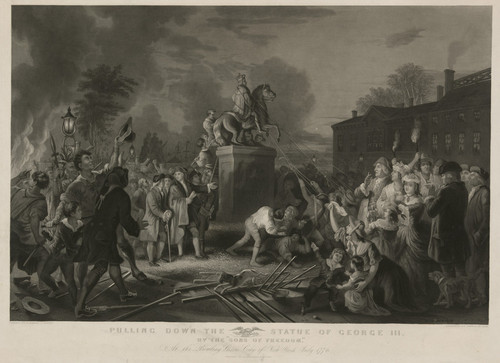
Pulling Down the Statue of George III by the "Sons of Freedom"
Stirred up after hearing the Declaration of Independence read publicly on July 9, 1776, the so-called Sons of Freedom—a mix of George Washington's soldiers and civilians—tear down a statue of the British monarch George III in New York City.
The lead statue was later moved to Connecticut and used to make guns and bullets.
This engraving, based roughly on a painting created about 1859, shows a mix of white men, women, and children of varying social classes, as well as an Indian in headdress carrying a spear (at left).
In contrast, a contemporary print of the event made in Europe in 1776 portrayed a group of free blacks or slaves helping to topple the statue.
The equestrian statue had originally been erected in Bowling Green, a public park in lower Manhattan, in the wake of the king's help in repealing the hated Stamp Act of 1765.
Original Author: John C. McRae, engraver; based on a painting by Johannes A. Oertel - Created: Engraving ca. 1875; painting ca. 1859 - Medium: Engraving
Source: Courtesy of Library of Congress Prints & Photographs Division
message 9:
by
Bentley, Group Founder, Leader, Chief
(last edited Jun 22, 2020 05:19AM)
(new)
-
rated it 4 stars
General Howe is back off the Coast of Staten Island and curling along the lower lip of Manhattan opening fire at 4:05PM.
Atkinson wrote: "General Howe had an answer to the Declaration of Independence, and he sent it on Friday afternoon, July 12!
General William Howe

This is a color mezzotint of British General Sir William Howe, 5th Viscount Howe, active in the American Revolutionary War at Brown University
William Howe, 5th Viscount Howe, KB, PC (10 August 1729 – 12 July 1814) was a British Army officer who rose to become Commander-in-Chief of British land forces in the Colonies during the American War of Independence. Howe was one of three brothers who had distinguished military careers. In historiography of the American war he is usually referred to as Sir William Howe to distinguish his brother Richard, who was 4th Viscount Howe at that time.
Having joined the army in 1746, Howe saw extensive service in the War of the Austrian Succession and Seven Years' War. He became known for his role in the capture of Quebec in 1759 when he led a British force to capture the cliffs at Anse-au-Foulon, allowing James Wolfe to land his army and engage the French in the Battle of the Plains of Abraham. Howe also participated in the campaigns to take Louisbourg, Belle Île and Havana.
He was appointed Lieutenant-Governor of the Isle of Wight, a post he held until 1795.
Howe was sent to North America in March 1775, arriving in May after the American War of Independence broke out. After leading British troops to a costly victory in the Battle of Bunker Hill, Howe took command of all British forces in America from Thomas Gage in September of that year. Howe's record in North America was marked by the successful capture of both New York City and Philadelphia. However, poor British campaign planning for 1777 contributed to the failure of John Burgoyne's Saratoga campaign, which played a major role in the entry of France into the war. Howe's role in developing those plans and the degree to which he was responsible for British failures that year (despite his personal success at Philadelphia) have both been subjects of contemporary and historic debate.
He was knighted after his successes in 1776. He resigned his post as Commander-in-Chief, British land forces in America, in 1777, and the next year returned to England, where he was at times active in the defence of the British Isles. He sat in the House of Commons from 1758 to 1780 for Nottingham. He inherited the Viscountcy of Howe upon the death of his brother Richard in 1799. He married, but had no children, and the viscountcy became extinct with his death in 1814."
Remainder of article:
https://en.wikipedia.org/wiki/William...
More:
https://en.wikisource.org/wiki/1911_E...
General Howe's Orderly Book
https://archive.org/details/generalsi...
From the American Battlefield Trust:
https://www.battlefields.org/learn/bi...
The Enigma of General Howe:
https://www.americanheritage.com/enig...
He did not want to fight the Americans because they were British but was called to serve his King.
Letter from George Washington to General Howe
https://founders.archives.gov/documen...
The Conquerors: William Howe - Conqueror of New York
Video Link (quite good): https://youtu.be/0zM5y3grWJo
Bunker Hill was a devastating blow to Howe - even though he won the hill (Breeds Hill) he lost over 40% of his forces doing so.
The Brown Bess - musket of choice for British during RW

Revolutionary War Brown Bess Flintlock Musket – Tower Short Land Pattern Brown Bess with Bayonet
After surviving the bloodletting at Bunker Hill, Major General William Howe took command of all British forces in America, overseeing both the evacuation of Boston and the attack on New York. Famously taciturn, he “never wastes a monosyllable,” one wit quipped.

 by William Howe (no photo)
by William Howe (no photo)
 by Joseph Galloway (no photo)
by Joseph Galloway (no photo)
 by Barnet Schecter (no photo)
by Barnet Schecter (no photo)
 by Edwin G. Burrows (no photo)
by Edwin G. Burrows (no photo)
Sources: Wikipedia, Brown University, Encyclopedia Britannica, Internet Archive, The American Battlefield Trust, American Heritage, Founders on Line - General Archives, Youtube, Encyclopedia of Virginia, Worthington Galleries, History Channel
Atkinson wrote: "General Howe had an answer to the Declaration of Independence, and he sent it on Friday afternoon, July 12!
General William Howe

This is a color mezzotint of British General Sir William Howe, 5th Viscount Howe, active in the American Revolutionary War at Brown University
William Howe, 5th Viscount Howe, KB, PC (10 August 1729 – 12 July 1814) was a British Army officer who rose to become Commander-in-Chief of British land forces in the Colonies during the American War of Independence. Howe was one of three brothers who had distinguished military careers. In historiography of the American war he is usually referred to as Sir William Howe to distinguish his brother Richard, who was 4th Viscount Howe at that time.
Having joined the army in 1746, Howe saw extensive service in the War of the Austrian Succession and Seven Years' War. He became known for his role in the capture of Quebec in 1759 when he led a British force to capture the cliffs at Anse-au-Foulon, allowing James Wolfe to land his army and engage the French in the Battle of the Plains of Abraham. Howe also participated in the campaigns to take Louisbourg, Belle Île and Havana.
He was appointed Lieutenant-Governor of the Isle of Wight, a post he held until 1795.
Howe was sent to North America in March 1775, arriving in May after the American War of Independence broke out. After leading British troops to a costly victory in the Battle of Bunker Hill, Howe took command of all British forces in America from Thomas Gage in September of that year. Howe's record in North America was marked by the successful capture of both New York City and Philadelphia. However, poor British campaign planning for 1777 contributed to the failure of John Burgoyne's Saratoga campaign, which played a major role in the entry of France into the war. Howe's role in developing those plans and the degree to which he was responsible for British failures that year (despite his personal success at Philadelphia) have both been subjects of contemporary and historic debate.
He was knighted after his successes in 1776. He resigned his post as Commander-in-Chief, British land forces in America, in 1777, and the next year returned to England, where he was at times active in the defence of the British Isles. He sat in the House of Commons from 1758 to 1780 for Nottingham. He inherited the Viscountcy of Howe upon the death of his brother Richard in 1799. He married, but had no children, and the viscountcy became extinct with his death in 1814."
Remainder of article:
https://en.wikipedia.org/wiki/William...
More:
https://en.wikisource.org/wiki/1911_E...
General Howe's Orderly Book
https://archive.org/details/generalsi...
From the American Battlefield Trust:
https://www.battlefields.org/learn/bi...
The Enigma of General Howe:
https://www.americanheritage.com/enig...
He did not want to fight the Americans because they were British but was called to serve his King.
Letter from George Washington to General Howe
https://founders.archives.gov/documen...
The Conquerors: William Howe - Conqueror of New York
Video Link (quite good): https://youtu.be/0zM5y3grWJo
Bunker Hill was a devastating blow to Howe - even though he won the hill (Breeds Hill) he lost over 40% of his forces doing so.
The Brown Bess - musket of choice for British during RW

Revolutionary War Brown Bess Flintlock Musket – Tower Short Land Pattern Brown Bess with Bayonet
After surviving the bloodletting at Bunker Hill, Major General William Howe took command of all British forces in America, overseeing both the evacuation of Boston and the attack on New York. Famously taciturn, he “never wastes a monosyllable,” one wit quipped.

 by William Howe (no photo)
by William Howe (no photo) by Joseph Galloway (no photo)
by Joseph Galloway (no photo) by Barnet Schecter (no photo)
by Barnet Schecter (no photo) by Edwin G. Burrows (no photo)
by Edwin G. Burrows (no photo)Sources: Wikipedia, Brown University, Encyclopedia Britannica, Internet Archive, The American Battlefield Trust, American Heritage, Founders on Line - General Archives, Youtube, Encyclopedia of Virginia, Worthington Galleries, History Channel
message 10:
by
Bentley, Group Founder, Leader, Chief
(last edited Jun 22, 2020 03:13PM)
(new)
-
rated it 4 stars
The Battle of Long Island
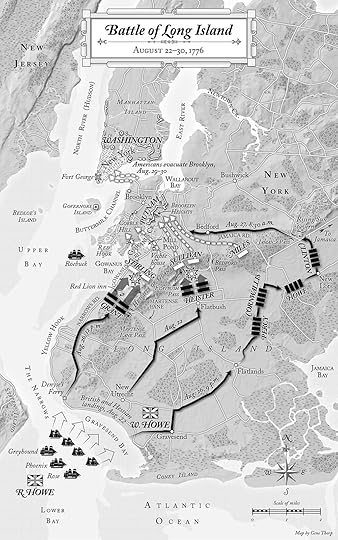
Animated version of the battle
Link: https://youtu.be/kiMS09xI1GI
Liberty - Battle of Long Island PBS
Link: https://youtu.be/LdPI6T1kqD0
Source: The Armchair Historian, Youtube, PBS
More:
 by
by
 Jeremy Black
Jeremy Black
 by Nicholas A.M. Rodger (no photo)
by Nicholas A.M. Rodger (no photo)
 by
by
 Pauline Maier
Pauline Maier
 by
by
 Pauline Maier
Pauline Maier
 by
by
 Pauline Maier
Pauline Maier
 by George C. Neumann (no photo)
by George C. Neumann (no photo)
 byGeorge C. Neumann (no photo)
byGeorge C. Neumann (no photo)

Animated version of the battle
Link: https://youtu.be/kiMS09xI1GI
Liberty - Battle of Long Island PBS
Link: https://youtu.be/LdPI6T1kqD0
Source: The Armchair Historian, Youtube, PBS
More:
 by
by
 Jeremy Black
Jeremy Black by Nicholas A.M. Rodger (no photo)
by Nicholas A.M. Rodger (no photo) by
by
 Pauline Maier
Pauline Maier by
by
 Pauline Maier
Pauline Maier by
by
 Pauline Maier
Pauline Maier by George C. Neumann (no photo)
by George C. Neumann (no photo) byGeorge C. Neumann (no photo)
byGeorge C. Neumann (no photo)
message 11:
by
Bentley, Group Founder, Leader, Chief
(last edited Jun 22, 2020 01:29PM)
(new)
-
rated it 4 stars
George Washington's Rules of Civility and Decent Behavior in Company and Conversation

"By age sixteen, Washington had copied out by hand, 110 Rules of Civility & Decent Behavior in Company and Conversation.
They are based on a set of rules composed by French Jesuits in 1595. Presumably they were copied out as part of an exercise in penmanship assigned by young Washington's schoolmaster.
The first English translation of the French rules appeared in 1640, and are ascribed to Francis Hawkins the twelve-year-old son of a doctor.
Today many, if not all of these rules, sound a little fussy if not downright silly. It would be easy to dismiss them as outdated and appropriate to a time of powdered wigs and quills, but they reflect a focus that is increasingly difficult to find.
The rules have in common a focus on other people rather than the narrow focus of our own self-interests that we find so prevalent today. Fussy or not, they represent more than just manners. They are the small sacrifices that we should all be willing to make for the good of all and the sake of living together.
These rules proclaim our respect for others and in turn give us the gift of self-respect and heightened self-esteem.
Richard Brookhiser, in his book on Washington wrote that "all modern manners in the western world were originally aristocratic.
Courtesy meant behavior appropriate to a court; chivalry comes from chevalier – a knight.
Yet Washington was to dedicate himself to freeing America from a court's control. Could manners survive the operation? Without realizing it, the Jesuits who wrote them, and the young man who copied them, were outlining and absorbing a system of courtesy appropriate to equals and near-equals.
When the company for whom the decent behavior was to be performed expanded to the nation, Washington was ready. Parson Weems got this right, when he wrote that it was 'no wonder every body honoured him who honoured every body.'"
The Rules:
1st Every Action done in Company, ought to be with Some Sign of Respect, to those that are Present.
2nd When in Company, put not your Hands to any Part of the Body, not usually Discovered. Be considerate of others. Do not embarrass others.
3rd Show Nothing to your Friend that may affright him.
4th In the Presence of Others Sing not to yourself with a humming Noise, nor Drum with your Fingers or Feet.
5th If You Cough, Sneeze, Sigh, or Yawn, do it not Loud but Privately; and Speak not in your Yawning, but put Your handkerchief or Hand before your face and turn aside.
6th Sleep not when others Speak, Sit not when others stand, Speak not when you Should hold your Peace, walk not on when others Stop.
7th Put not off your Cloths in the presence of Others, nor go out your Chamber half Dressed.
8th At Play and at Fire its Good manners to Give Place to the last Commer, and affect not to Speak Louder than Ordinary.
9th Spit not in the Fire, nor Stoop low before it neither Put your Hands into the Flames to warm them, nor Set your Feet upon the Fire especially if there be meat before it.
10th When you Sit down, Keep your Feet firm and Even, without putting one on the other or Crossing them.
11th Shift not yourself in the Sight of others nor Gnaw your nails.
12th Shake not the head, Feet, or Legs roll not the Eyes lift not one eyebrow higher than the other wry not the mouth, and bedew no mans face with your Spittle, by approaching too near him when you Speak.
13th Kill no Vermin as Fleas, lice ticks &c in the Sight of Others, if you See any filth or thick Spittle put your foot Dexterously upon it if it be upon the Cloths of your Companions, Put it off privately, and if it be upon your own Cloths return Thanks to him who puts it off.
14th Turn not your Back to others especially in Speaking, Jog not the Table or Desk on which Another reads or writes, lean not upon any one.
15th Keep your Nails clean and Short, also your Hands and Teeth Clean yet without Showing any great Concern for them.
16th Do not Puff up the Cheeks, Loll not out the tongue rub the Hands, or beard, thrust out the lips, or bite them or keep the Lips too open or too Close.
17th Be no Flatterer, neither Play with any that delights not to be Play'd Withal.
18th Read no Letters, Books, or Papers in Company but when there is a Necessity for the doing of it you must ask leave: come not near the Books or Writings of Another so as to read them unless desired or give your opinion of them unasked also look not nigh when another is writing a Letter.
19th Let your Countenance be pleasant but in Serious Matters Somewhat grave.
20th The Gestures of the Body must be Suited to the discourse you are upon.
21st Reproach none for the Infirmities of Nature, nor Delight to Put them that have in mind thereof.
22nd Show not yourself glad at the Misfortune of another though he were your enemy.
23rd When you see a Crime punished, you may be inwardly Pleased; but always show Pity to the Suffering Offender.
Don't draw attention to yourself.
24th Do not laugh too loud or too much at any Public Spectacle.
25th Superfluous Complements and all Affectation of Ceremony are to be avoided, yet where due they are not to be Neglected.
26th In Pulling off your Hat to Persons of Distinction, as Noblemen, Justices, Churchmen &c make a Reverence, bowing more or less according to the Custom of the Better Bred, and Quality of the Person. Amongst your equals expect not always that they Should begin with you first, but to Pull off the Hat when there is no need is Affectation, in the Manner of Saluting and resaluting in words keep to the most usual Custom.
27th Tis ill manners to bid one more eminent than yourself be covered as well as not to do it to whom it's due Likewise he that makes too much haste to Put on his hat does not well, yet he ought to Put it on at the first, or at most the Second time of being asked; now what is herein Spoken, of Qualification in behavior in Saluting, ought also to be observed in taking of Place, and Sitting down for ceremonies without Bounds is troublesome.
28th If any one come to Speak to you while you are are Sitting Stand up though he be your Inferior, and when you Present Seats let it be to every one according to his Degree.
29th When you meet with one of Greater Quality than yourself, Stop, and retire especially if it be at a Door or any Straight place to give way for him to Pass.
30th In walking the highest Place in most Countries Seems to be on the right hand therefore Place yourself on the left of him whom you desire to Honor: but if three walk together the middest Place is the most Honorable the wall is usually given to the most worthy if two walk together.
31st If any one far Surpasses others, either in age, Estate, or Merit yet would give Place to a meaner than himself in his own lodging or elsewhere the one ought not to except it, So he on the other part should not use much earnestness nor offer it above once or twice.
32nd To one that is your equal, or not much inferior you are to give the chief Place in your Lodging and he to who 'is offered ought at the first to refuse it but at the Second to accept though not without acknowledging his own unworthiness.
33rd They that are in Dignity or in office have in all places Precedency but whilst they are Young they ought to respect those that are their equals in Birth or other Qualities, though they have no Public charge.
34th It is good Manners to prefer them to whom we Speak before ourselves especially if they be above us with whom in no Sort we ought to begin. When you speak, be concise.
35th Let your Discourse with Men of Business be Short and Comprehensive.
36th Artificers & Persons of low Degree ought not to use many ceremonies to Lords, or Others of high Degree but Respect and highly Honor them, and those of high Degree ought to treat them with affability & Courtesy, without Arrogance.
37th In speaking to men of Quality do not lean nor Look them full in the Face, nor approach too near them at lest Keep a full Pace from them.
38th In visiting the Sick, do not Presently play the Physician if you be not Knowing therein.
39th In writing or Speaking, give to every Person his due Title According to his Degree & the Custom of the Place. Do not argue with your superior. Submit your ideas with humility.
40th Strive not with your Superiors in argument, but always Submit your Judgment to others with Modesty.
41st Undertake not to Teach your equal in the art himself Professes; it Savours of arrogance.
42nd Let thy ceremonies in Courtesy be proper to the Dignity of his place with whom thou converses for it is absurd to act the same with a Clown and a Prince.
43rd Do not express Joy before one sick or in pain for that contrary Passion will aggravate his Misery. When a person does their best and fails, do not criticize him.
44th When a man does all he can though it Succeeds not well blame not him that did it. When you must give advice or criticism, consider the timing, whether it should be given in public or private, the manner and above all be gentle."
Source: Foundations Magazine (continued in next post)

"By age sixteen, Washington had copied out by hand, 110 Rules of Civility & Decent Behavior in Company and Conversation.
They are based on a set of rules composed by French Jesuits in 1595. Presumably they were copied out as part of an exercise in penmanship assigned by young Washington's schoolmaster.
The first English translation of the French rules appeared in 1640, and are ascribed to Francis Hawkins the twelve-year-old son of a doctor.
Today many, if not all of these rules, sound a little fussy if not downright silly. It would be easy to dismiss them as outdated and appropriate to a time of powdered wigs and quills, but they reflect a focus that is increasingly difficult to find.
The rules have in common a focus on other people rather than the narrow focus of our own self-interests that we find so prevalent today. Fussy or not, they represent more than just manners. They are the small sacrifices that we should all be willing to make for the good of all and the sake of living together.
These rules proclaim our respect for others and in turn give us the gift of self-respect and heightened self-esteem.
Richard Brookhiser, in his book on Washington wrote that "all modern manners in the western world were originally aristocratic.
Courtesy meant behavior appropriate to a court; chivalry comes from chevalier – a knight.
Yet Washington was to dedicate himself to freeing America from a court's control. Could manners survive the operation? Without realizing it, the Jesuits who wrote them, and the young man who copied them, were outlining and absorbing a system of courtesy appropriate to equals and near-equals.
When the company for whom the decent behavior was to be performed expanded to the nation, Washington was ready. Parson Weems got this right, when he wrote that it was 'no wonder every body honoured him who honoured every body.'"
The Rules:
1st Every Action done in Company, ought to be with Some Sign of Respect, to those that are Present.
2nd When in Company, put not your Hands to any Part of the Body, not usually Discovered. Be considerate of others. Do not embarrass others.
3rd Show Nothing to your Friend that may affright him.
4th In the Presence of Others Sing not to yourself with a humming Noise, nor Drum with your Fingers or Feet.
5th If You Cough, Sneeze, Sigh, or Yawn, do it not Loud but Privately; and Speak not in your Yawning, but put Your handkerchief or Hand before your face and turn aside.
6th Sleep not when others Speak, Sit not when others stand, Speak not when you Should hold your Peace, walk not on when others Stop.
7th Put not off your Cloths in the presence of Others, nor go out your Chamber half Dressed.
8th At Play and at Fire its Good manners to Give Place to the last Commer, and affect not to Speak Louder than Ordinary.
9th Spit not in the Fire, nor Stoop low before it neither Put your Hands into the Flames to warm them, nor Set your Feet upon the Fire especially if there be meat before it.
10th When you Sit down, Keep your Feet firm and Even, without putting one on the other or Crossing them.
11th Shift not yourself in the Sight of others nor Gnaw your nails.
12th Shake not the head, Feet, or Legs roll not the Eyes lift not one eyebrow higher than the other wry not the mouth, and bedew no mans face with your Spittle, by approaching too near him when you Speak.
13th Kill no Vermin as Fleas, lice ticks &c in the Sight of Others, if you See any filth or thick Spittle put your foot Dexterously upon it if it be upon the Cloths of your Companions, Put it off privately, and if it be upon your own Cloths return Thanks to him who puts it off.
14th Turn not your Back to others especially in Speaking, Jog not the Table or Desk on which Another reads or writes, lean not upon any one.
15th Keep your Nails clean and Short, also your Hands and Teeth Clean yet without Showing any great Concern for them.
16th Do not Puff up the Cheeks, Loll not out the tongue rub the Hands, or beard, thrust out the lips, or bite them or keep the Lips too open or too Close.
17th Be no Flatterer, neither Play with any that delights not to be Play'd Withal.
18th Read no Letters, Books, or Papers in Company but when there is a Necessity for the doing of it you must ask leave: come not near the Books or Writings of Another so as to read them unless desired or give your opinion of them unasked also look not nigh when another is writing a Letter.
19th Let your Countenance be pleasant but in Serious Matters Somewhat grave.
20th The Gestures of the Body must be Suited to the discourse you are upon.
21st Reproach none for the Infirmities of Nature, nor Delight to Put them that have in mind thereof.
22nd Show not yourself glad at the Misfortune of another though he were your enemy.
23rd When you see a Crime punished, you may be inwardly Pleased; but always show Pity to the Suffering Offender.
Don't draw attention to yourself.
24th Do not laugh too loud or too much at any Public Spectacle.
25th Superfluous Complements and all Affectation of Ceremony are to be avoided, yet where due they are not to be Neglected.
26th In Pulling off your Hat to Persons of Distinction, as Noblemen, Justices, Churchmen &c make a Reverence, bowing more or less according to the Custom of the Better Bred, and Quality of the Person. Amongst your equals expect not always that they Should begin with you first, but to Pull off the Hat when there is no need is Affectation, in the Manner of Saluting and resaluting in words keep to the most usual Custom.
27th Tis ill manners to bid one more eminent than yourself be covered as well as not to do it to whom it's due Likewise he that makes too much haste to Put on his hat does not well, yet he ought to Put it on at the first, or at most the Second time of being asked; now what is herein Spoken, of Qualification in behavior in Saluting, ought also to be observed in taking of Place, and Sitting down for ceremonies without Bounds is troublesome.
28th If any one come to Speak to you while you are are Sitting Stand up though he be your Inferior, and when you Present Seats let it be to every one according to his Degree.
29th When you meet with one of Greater Quality than yourself, Stop, and retire especially if it be at a Door or any Straight place to give way for him to Pass.
30th In walking the highest Place in most Countries Seems to be on the right hand therefore Place yourself on the left of him whom you desire to Honor: but if three walk together the middest Place is the most Honorable the wall is usually given to the most worthy if two walk together.
31st If any one far Surpasses others, either in age, Estate, or Merit yet would give Place to a meaner than himself in his own lodging or elsewhere the one ought not to except it, So he on the other part should not use much earnestness nor offer it above once or twice.
32nd To one that is your equal, or not much inferior you are to give the chief Place in your Lodging and he to who 'is offered ought at the first to refuse it but at the Second to accept though not without acknowledging his own unworthiness.
33rd They that are in Dignity or in office have in all places Precedency but whilst they are Young they ought to respect those that are their equals in Birth or other Qualities, though they have no Public charge.
34th It is good Manners to prefer them to whom we Speak before ourselves especially if they be above us with whom in no Sort we ought to begin. When you speak, be concise.
35th Let your Discourse with Men of Business be Short and Comprehensive.
36th Artificers & Persons of low Degree ought not to use many ceremonies to Lords, or Others of high Degree but Respect and highly Honor them, and those of high Degree ought to treat them with affability & Courtesy, without Arrogance.
37th In speaking to men of Quality do not lean nor Look them full in the Face, nor approach too near them at lest Keep a full Pace from them.
38th In visiting the Sick, do not Presently play the Physician if you be not Knowing therein.
39th In writing or Speaking, give to every Person his due Title According to his Degree & the Custom of the Place. Do not argue with your superior. Submit your ideas with humility.
40th Strive not with your Superiors in argument, but always Submit your Judgment to others with Modesty.
41st Undertake not to Teach your equal in the art himself Professes; it Savours of arrogance.
42nd Let thy ceremonies in Courtesy be proper to the Dignity of his place with whom thou converses for it is absurd to act the same with a Clown and a Prince.
43rd Do not express Joy before one sick or in pain for that contrary Passion will aggravate his Misery. When a person does their best and fails, do not criticize him.
44th When a man does all he can though it Succeeds not well blame not him that did it. When you must give advice or criticism, consider the timing, whether it should be given in public or private, the manner and above all be gentle."
Source: Foundations Magazine (continued in next post)
message 12:
by
Bentley, Group Founder, Leader, Chief
(last edited Jun 22, 2020 01:16PM)
(new)
-
rated it 4 stars
Continued from above:
45th Being to advise or reprehend any one, consider whether it ought to be in public or in Private; presently, or at Some other time in what terms to do it & in reproving Show no Sign of Cholar but do it with all Sweetness and Mildness. If you are corrected, take it without argument. If you were wrongly judged, correct it later.
46th Take all Admonitions thankfully in what Time or Place Soever given but afterwards not being culpable take a Time & Place convenient to let him him know it that gave them. Do not make fun of anything important to others.
47th Mock not nor Jest at any thing of Importance break [n]o Jest that are Sharp Biting and if you Deliver any thing witty and Pleasant abstain from Laughing thereat yourself. If you criticize someone else of something, make sure you are not guilty of it yourself. Actions speak louder than words.
48th Wherein you reprove Another be unblameable yourself; for example is more prevalent than Precepts.
49th Use no Reproachful Language against any one neither Curse nor Revile. Do not be quick to believe bad reports about others.
50th Be not hasty to believe flying Reports to the Disparagement of any.
51st Wear not your Cloths, foul, ripped or Dusty but See they be Brushed once every day at least and take heed that you approach not to any Uncleaness.
52nd In your Apparel be Modest and endeavor to accommodate Nature, rather than to procure Admiration keep to the Fashion of your equals Such as are Civil and orderly with respect to Times and Places.
53rd Run not in the Streets, neither go too slowly nor with Mouth open go not Shaking your Arms kick not the earth with R feet, go not upon the Toes, nor in a Dancing fashion.
54th Play not the Peacock, looking every where about you, to See if you be well Decked, if your Shoes fit well if your Stockings sit neatly, and Cloths handsomely.
55th Eat not in the Streets, nor in the House, out of Season.
Associate with good people. It is better to be alone than in bad company.
56th Associate yourself with Men of good Quality if you Esteem your own Reputation; for 'is better to be alone than in bad Company.
57th In walking up and Down in a House, only with One in Company if he be Greater than yourself, at the first give him the Right hand and Stop not till he does and be not the first that turns, and when you do turn let it be with your face towards him, if he be a Man of Great Quality, walk not with him Cheek by Joul but Somewhat behind him; but yet in Such a Manner that he may easily Speak to you. Always allow reason to govern your actions.
58th Let your Conversation be without Malice or Envy, for 'is a Sign of a Tractable and Commendable Nature: And in all Causes of Passion admit Reason to Govern. Never break the rules in front of your subordinates.
59th Never express anything unbecoming, nor Act against the Rules Moral before your inferiors. Some things are better kept secret.
60th Be not immodest in urging your Friends to Discover a Secret.
61st Utter not base and frivolous things amongst grave and Learned Men nor very Difficult Questions or Subjects, among the Ignorant or things hard to be believed, Stuff not your Discourse with Sentences amongst your Betters nor Equals.
62nd Speak not of doleful Things in a Time of Mirth or at the Table; Speak not of Melancholy Things as Death and Wounds, and if others Mention them Change if you can the Discourse tell not your Dreams, but to your intimate Friend. A person should not overly value their own accomplishments.
63rd A Man ought not to value himself of his Achievements, or rare Qualities of wit; much less of his riches Virtue or Kindred.
64th Break not a Jest where none take pleasure in mirth Laugh not aloud, nor at all without Occasion, deride no mans Misfortune, though there Seem to be Some cause.
65th Speak not injurious Words neither in Jest nor Earnest Scoff at none although they give Occasion.
66th Be not froward but friendly and Courteous; the first to Salute hear and answer & be not Pensive when it's a time to Converse.
Do not detract from others nor be overbearing in giving orders.
67th Detract not from others neither be excessive in Commanding.
Do not go where you are not wanted. Do not give unasked-for advice.
68th Go not thither, where you know not, whether you Shall be Welcome or not. Give not Advice without being Asked & when desired do it briefly. If two people disagree, do not take one side or the other. Be flexible in your own opinions and when you don't care, take the majority opinion.
69th If two contend together take not the part of either unconstrained; and be not obstinate in your own Opinion, in Things indifferent be of the Major Side. Do not correct others when it is not your place to do so.
70th Reprehend not the imperfections of others for that belongs to Parents Masters and Superiors.
71st Gaze not on the marks or blemishes of Others and ask not how they came. What you may Speak in Secret to your Friend deliver not before others.
72nd Speak not in an unknown Tongue in Company but in your own Language and that as those of Quality do and not as the Vulgar; Sublime matters treat Seriously.
73rd Think before you Speak pronounce not imperfectly nor bring out your Words too hastily but orderly & distinctly.
74th When Another Speaks be attentive your Self and disturb not the Audience if any hesitate in his Words help him not nor Prompt him without desired, Interrupt him not, nor Answer him till his Speech be ended.
75th In the midst of Discourse ask not of what one treateth but if you Perceive any Stop because of your coming you may well intreat him gently to Proceed: If a Person of Quality comes in while your Conversing it's handsome to Repeat what was said before.
76th While you are talking, Point not with your Finger at him of Whom you Discourse nor Approach too near him to whom you talk especially to his face.
77th Treat with men at fit Times about Business & Whisper not in the Company of Others. Don't compare yourselves amongst yourselves.
78th Make no Comparisons and if any of the Company be Commended for any brave act of Virtue, commend not another for the Same. Do not be quick to talk about something when you don't have all the facts.
79th Be not apt to relate News if you know not the truth thereof. In Discoursing of things you Have heard Name not your Author always A Secret Discover not.
80th Be not Tedious in Discourse or in reading unless you find the Company pleased therewith.
Source: Foundations Magazine (continued in next post)
45th Being to advise or reprehend any one, consider whether it ought to be in public or in Private; presently, or at Some other time in what terms to do it & in reproving Show no Sign of Cholar but do it with all Sweetness and Mildness. If you are corrected, take it without argument. If you were wrongly judged, correct it later.
46th Take all Admonitions thankfully in what Time or Place Soever given but afterwards not being culpable take a Time & Place convenient to let him him know it that gave them. Do not make fun of anything important to others.
47th Mock not nor Jest at any thing of Importance break [n]o Jest that are Sharp Biting and if you Deliver any thing witty and Pleasant abstain from Laughing thereat yourself. If you criticize someone else of something, make sure you are not guilty of it yourself. Actions speak louder than words.
48th Wherein you reprove Another be unblameable yourself; for example is more prevalent than Precepts.
49th Use no Reproachful Language against any one neither Curse nor Revile. Do not be quick to believe bad reports about others.
50th Be not hasty to believe flying Reports to the Disparagement of any.
51st Wear not your Cloths, foul, ripped or Dusty but See they be Brushed once every day at least and take heed that you approach not to any Uncleaness.
52nd In your Apparel be Modest and endeavor to accommodate Nature, rather than to procure Admiration keep to the Fashion of your equals Such as are Civil and orderly with respect to Times and Places.
53rd Run not in the Streets, neither go too slowly nor with Mouth open go not Shaking your Arms kick not the earth with R feet, go not upon the Toes, nor in a Dancing fashion.
54th Play not the Peacock, looking every where about you, to See if you be well Decked, if your Shoes fit well if your Stockings sit neatly, and Cloths handsomely.
55th Eat not in the Streets, nor in the House, out of Season.
Associate with good people. It is better to be alone than in bad company.
56th Associate yourself with Men of good Quality if you Esteem your own Reputation; for 'is better to be alone than in bad Company.
57th In walking up and Down in a House, only with One in Company if he be Greater than yourself, at the first give him the Right hand and Stop not till he does and be not the first that turns, and when you do turn let it be with your face towards him, if he be a Man of Great Quality, walk not with him Cheek by Joul but Somewhat behind him; but yet in Such a Manner that he may easily Speak to you. Always allow reason to govern your actions.
58th Let your Conversation be without Malice or Envy, for 'is a Sign of a Tractable and Commendable Nature: And in all Causes of Passion admit Reason to Govern. Never break the rules in front of your subordinates.
59th Never express anything unbecoming, nor Act against the Rules Moral before your inferiors. Some things are better kept secret.
60th Be not immodest in urging your Friends to Discover a Secret.
61st Utter not base and frivolous things amongst grave and Learned Men nor very Difficult Questions or Subjects, among the Ignorant or things hard to be believed, Stuff not your Discourse with Sentences amongst your Betters nor Equals.
62nd Speak not of doleful Things in a Time of Mirth or at the Table; Speak not of Melancholy Things as Death and Wounds, and if others Mention them Change if you can the Discourse tell not your Dreams, but to your intimate Friend. A person should not overly value their own accomplishments.
63rd A Man ought not to value himself of his Achievements, or rare Qualities of wit; much less of his riches Virtue or Kindred.
64th Break not a Jest where none take pleasure in mirth Laugh not aloud, nor at all without Occasion, deride no mans Misfortune, though there Seem to be Some cause.
65th Speak not injurious Words neither in Jest nor Earnest Scoff at none although they give Occasion.
66th Be not froward but friendly and Courteous; the first to Salute hear and answer & be not Pensive when it's a time to Converse.
Do not detract from others nor be overbearing in giving orders.
67th Detract not from others neither be excessive in Commanding.
Do not go where you are not wanted. Do not give unasked-for advice.
68th Go not thither, where you know not, whether you Shall be Welcome or not. Give not Advice without being Asked & when desired do it briefly. If two people disagree, do not take one side or the other. Be flexible in your own opinions and when you don't care, take the majority opinion.
69th If two contend together take not the part of either unconstrained; and be not obstinate in your own Opinion, in Things indifferent be of the Major Side. Do not correct others when it is not your place to do so.
70th Reprehend not the imperfections of others for that belongs to Parents Masters and Superiors.
71st Gaze not on the marks or blemishes of Others and ask not how they came. What you may Speak in Secret to your Friend deliver not before others.
72nd Speak not in an unknown Tongue in Company but in your own Language and that as those of Quality do and not as the Vulgar; Sublime matters treat Seriously.
73rd Think before you Speak pronounce not imperfectly nor bring out your Words too hastily but orderly & distinctly.
74th When Another Speaks be attentive your Self and disturb not the Audience if any hesitate in his Words help him not nor Prompt him without desired, Interrupt him not, nor Answer him till his Speech be ended.
75th In the midst of Discourse ask not of what one treateth but if you Perceive any Stop because of your coming you may well intreat him gently to Proceed: If a Person of Quality comes in while your Conversing it's handsome to Repeat what was said before.
76th While you are talking, Point not with your Finger at him of Whom you Discourse nor Approach too near him to whom you talk especially to his face.
77th Treat with men at fit Times about Business & Whisper not in the Company of Others. Don't compare yourselves amongst yourselves.
78th Make no Comparisons and if any of the Company be Commended for any brave act of Virtue, commend not another for the Same. Do not be quick to talk about something when you don't have all the facts.
79th Be not apt to relate News if you know not the truth thereof. In Discoursing of things you Have heard Name not your Author always A Secret Discover not.
80th Be not Tedious in Discourse or in reading unless you find the Company pleased therewith.
Source: Foundations Magazine (continued in next post)
message 13:
by
Bentley, Group Founder, Leader, Chief
(last edited Jun 22, 2020 01:34PM)
(new)
-
rated it 4 stars
Continued from above:
81st Be not Curious to Know the Affairs of Others neither approach those that Speak in Private. Do not start what you cannot finish. Keep your promises.
82nd Undertake not what you cannot Perform but be Careful to keep your Promise.
83rd When you deliver a matter do it without Passion & with Discretion, however mean the Person be you do it too.
84th When your Superiors talk to any Body hearken not neither Speak nor Laugh.
85th In Company of these of Higher Quality than yourself Speak not til you are asked a Question then Stand upright put off your Hat & Answer in few words.
86th In Disputes, be not So Desirous to Overcome as not to give Liberty to each one to deliver his Opinion and Submit to the Judgment of the Major Part especially if they are Judges of the Dispute.
87th Let thy carriage be such as becomes a Man Grave Settled and attentive to that which is spoken. Contradict not at every turn what others Say.
88th Be not tedious in Discourse, make not many Digressions, nor repeat often the Same manner of Discourse. Do not speak badly of those who are not present.
89th Speak not Evil of the absent for it is unjust.
90th Being Set at meat Scratch not neither Spit Cough or blow your Nose except there's a Necessity for it.
91st Make no Show of taking great Delight in your Victuals, Feed not with Greediness; cut your Bread with a Knife, lean not on the Table neither find fault with what you Eat.
92nd Take no Salt or cut Bread with your Knife Greasy.
93rd Entertaining any one at the table, it is decent to present him with meat; Undertake not to help others undesired by the Master.
94th If you Soak bread in the Sauce let it be no more than what you put in your Mouth at a time and blow not your broth at Table but Stay till Cools of it Self.
95th Put not your meat to your Mouth with your Knife in your hand neither Spit forth the Stones of any fruit Pie upon a Dish nor Cast anything under the table.
96th It's unbecoming to Stoop much to ones Meat Keep your Fingers clean & when foul wipe them on a Corner of your Table Napkin.
Don't take so big a bite that you must chew with your mouth open.
97th Put not another bit into your mouth till the former be swallowed. Let not your morsels be too big for the jowls.
98th Drink not nor talk with your mouth full; neither gaze about you while you are drinking.
99th Drink not too leisurely nor yet too hastily. Before and after drinking, wipe your lips; breath not then or ever with too great a noise, for its uncivil.
100th Cleanse not your teeth with the table cloth napkin, fork, or knife; but if others do it, let it be done without a peep to them.
101st Rinse not your mouth in the presence of others.
102nd It is out of use to call upon the company often to eat; nor need you drink to others every time you drink.
103rd In the company of your betters, be not longer in eating than they are; lay not your arm but only your hand upon the table.
104th It belongs to the chiefest in company to unfold his napkin and fall to meat first, but he ought then to begin in time & to dispatch with dexterity that the slowest may have time allowed him.
105th Be not angry at the table whatever happens & if you have reason to be so, show it not; put on a cheerful countenance especially if there be strangers, for good humor makes one dish of meat a feast.
106th Set not yourself at the upper of the table; but if it be your due or that the master of the house will have it so, contend not, least you should trouble the company. Show interest in others conversation, but don't talk with your mouth full.
107th If others talk at the table, be attentive but talk not with meat in your mouth.
108th When you speak of God or his attributes, let it be seriously & with reverence. Honor & obey your natural parents although they be poor.
109th Let your recreations be manful not sinful. Don't allow yourself to become jaded, cynical or calloused.
110th Labor to keep alive in your breast that little spark of celestial fire called conscience.
Source: Foundations Magazine
More:
What George Washington Knew About Etiquette
Link: https://www.cliseetiquette.com/3887/
 by
by
 George Washington
George Washington
81st Be not Curious to Know the Affairs of Others neither approach those that Speak in Private. Do not start what you cannot finish. Keep your promises.
82nd Undertake not what you cannot Perform but be Careful to keep your Promise.
83rd When you deliver a matter do it without Passion & with Discretion, however mean the Person be you do it too.
84th When your Superiors talk to any Body hearken not neither Speak nor Laugh.
85th In Company of these of Higher Quality than yourself Speak not til you are asked a Question then Stand upright put off your Hat & Answer in few words.
86th In Disputes, be not So Desirous to Overcome as not to give Liberty to each one to deliver his Opinion and Submit to the Judgment of the Major Part especially if they are Judges of the Dispute.
87th Let thy carriage be such as becomes a Man Grave Settled and attentive to that which is spoken. Contradict not at every turn what others Say.
88th Be not tedious in Discourse, make not many Digressions, nor repeat often the Same manner of Discourse. Do not speak badly of those who are not present.
89th Speak not Evil of the absent for it is unjust.
90th Being Set at meat Scratch not neither Spit Cough or blow your Nose except there's a Necessity for it.
91st Make no Show of taking great Delight in your Victuals, Feed not with Greediness; cut your Bread with a Knife, lean not on the Table neither find fault with what you Eat.
92nd Take no Salt or cut Bread with your Knife Greasy.
93rd Entertaining any one at the table, it is decent to present him with meat; Undertake not to help others undesired by the Master.
94th If you Soak bread in the Sauce let it be no more than what you put in your Mouth at a time and blow not your broth at Table but Stay till Cools of it Self.
95th Put not your meat to your Mouth with your Knife in your hand neither Spit forth the Stones of any fruit Pie upon a Dish nor Cast anything under the table.
96th It's unbecoming to Stoop much to ones Meat Keep your Fingers clean & when foul wipe them on a Corner of your Table Napkin.
Don't take so big a bite that you must chew with your mouth open.
97th Put not another bit into your mouth till the former be swallowed. Let not your morsels be too big for the jowls.
98th Drink not nor talk with your mouth full; neither gaze about you while you are drinking.
99th Drink not too leisurely nor yet too hastily. Before and after drinking, wipe your lips; breath not then or ever with too great a noise, for its uncivil.
100th Cleanse not your teeth with the table cloth napkin, fork, or knife; but if others do it, let it be done without a peep to them.
101st Rinse not your mouth in the presence of others.
102nd It is out of use to call upon the company often to eat; nor need you drink to others every time you drink.
103rd In the company of your betters, be not longer in eating than they are; lay not your arm but only your hand upon the table.
104th It belongs to the chiefest in company to unfold his napkin and fall to meat first, but he ought then to begin in time & to dispatch with dexterity that the slowest may have time allowed him.
105th Be not angry at the table whatever happens & if you have reason to be so, show it not; put on a cheerful countenance especially if there be strangers, for good humor makes one dish of meat a feast.
106th Set not yourself at the upper of the table; but if it be your due or that the master of the house will have it so, contend not, least you should trouble the company. Show interest in others conversation, but don't talk with your mouth full.
107th If others talk at the table, be attentive but talk not with meat in your mouth.
108th When you speak of God or his attributes, let it be seriously & with reverence. Honor & obey your natural parents although they be poor.
109th Let your recreations be manful not sinful. Don't allow yourself to become jaded, cynical or calloused.
110th Labor to keep alive in your breast that little spark of celestial fire called conscience.
Source: Foundations Magazine
More:
What George Washington Knew About Etiquette
Link: https://www.cliseetiquette.com/3887/
 by
by
 George Washington
George Washington
message 14:
by
Bentley, Group Founder, Leader, Chief
(last edited Jun 22, 2020 02:07PM)
(new)
-
rated it 4 stars
New York: A Sobering Start
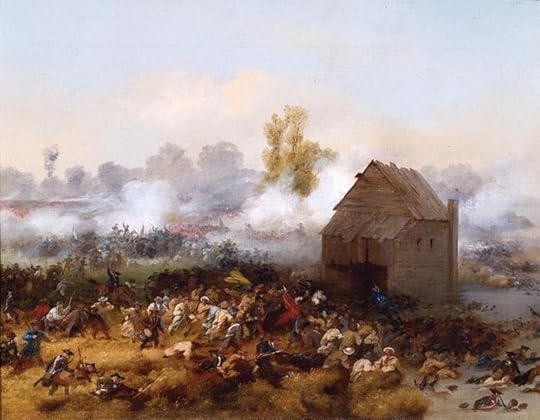
Lord Stirling Leading an Attack Against the British at the Battle of Long Island, 1776, Alonzo Chappel, 1858
"Washington marched his men south from Boston and moved them into position across the East River from Manhattan to Brooklyn Heights, within sight of the Redcoats across the harbor on Staten Island. The British offered Washington a pardon if he’d give up, but he refused. In August 1776, British routed Washington’s green troops, taking the western part of Long Island in the largest battle of the war, the Battle of Brooklyn Heights.
The British had the Continentals trapped in Brooklyn but Washington’s men slipped away in the fog, safely across the East River to Kip’s Bay, Manhattan — then known as New York Island, or York City. (Historian David McCullough called the escape in the fog “America’s Dunkirk,” referring to the British evacuation from Nazi-occupied northern France in 1940.)
The Brits also failed to pin down the Rebels in Manhattan in September. Washington’s men dug in their heels and won their first battle at Harlem Heights, but lost twice more at White Plains and Fort Washington in northern Manhattan.
They gave up and retreated to New Jersey and Pennsylvania that November, leaving Redcoats in control of New York and parts of eastern New Jersey. To mock them, British buglers played traditional fox hunting songs as the Continentals ran away."
Source for above: History Hub
 by
by
 John Keegan
John Keegan

Lord Stirling Leading an Attack Against the British at the Battle of Long Island, 1776, Alonzo Chappel, 1858
"Washington marched his men south from Boston and moved them into position across the East River from Manhattan to Brooklyn Heights, within sight of the Redcoats across the harbor on Staten Island. The British offered Washington a pardon if he’d give up, but he refused. In August 1776, British routed Washington’s green troops, taking the western part of Long Island in the largest battle of the war, the Battle of Brooklyn Heights.
The British had the Continentals trapped in Brooklyn but Washington’s men slipped away in the fog, safely across the East River to Kip’s Bay, Manhattan — then known as New York Island, or York City. (Historian David McCullough called the escape in the fog “America’s Dunkirk,” referring to the British evacuation from Nazi-occupied northern France in 1940.)
The Brits also failed to pin down the Rebels in Manhattan in September. Washington’s men dug in their heels and won their first battle at Harlem Heights, but lost twice more at White Plains and Fort Washington in northern Manhattan.
They gave up and retreated to New Jersey and Pennsylvania that November, leaving Redcoats in control of New York and parts of eastern New Jersey. To mock them, British buglers played traditional fox hunting songs as the Continentals ran away."
Source for above: History Hub
 by
by
 John Keegan
John Keegan
message 15:
by
Bentley, Group Founder, Leader, Chief
(last edited Jun 22, 2020 07:06PM)
(new)
-
rated it 4 stars
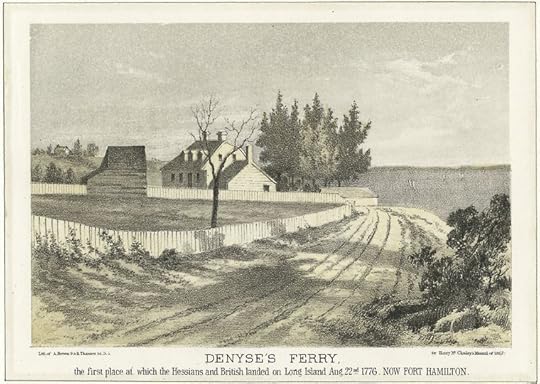
Denyse’s Ferry, the first place at which the British landed
Denyse’s Ferry, present day Bay Ridge
This is the site where the Battle of Brooklyn began. A British fleet commanded by Admiral Lord Richard Howe sailed up through the Narrows to make their sneak attack. On August 22nd, 20,000 troops unloaded on the Brooklyn shore near the Denyse Ferry landing. And on August 27th, the British made their attack. Today, this spot is located directly under the Verrazano Narrows Bridge and marked as part of the Revolutionary War Heritage Trail.
Sources: Wikipedia, 6sqft
message 16:
by
Bentley, Group Founder, Leader, Chief
(last edited Jun 22, 2020 09:54PM)
(new)
-
rated it 4 stars
The Red Lion Inn, present day Green-Wood Cemetery
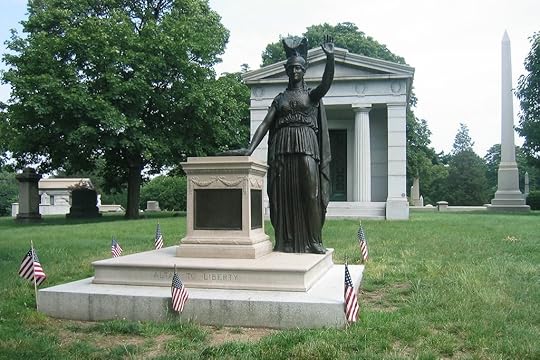
A rectangular plot of land adjacent to the main entrance of Green-Wood Cemetery—which now contains maintenance facilities and a garage alongside gravestones—was once the site of the Red Lion Inn. This Colonial tavern was the spot where the British first encountered American pickets. After an exchange of musket fire, the Americans retreated in a panic up the Gowanus Road to the Vechte-Cortelyou House.
More:
https://untappedcities.com/2013/12/09...
Sources: Wikipedia, 6sqft, Untapped Cities

A rectangular plot of land adjacent to the main entrance of Green-Wood Cemetery—which now contains maintenance facilities and a garage alongside gravestones—was once the site of the Red Lion Inn. This Colonial tavern was the spot where the British first encountered American pickets. After an exchange of musket fire, the Americans retreated in a panic up the Gowanus Road to the Vechte-Cortelyou House.
More:
https://untappedcities.com/2013/12/09...
Sources: Wikipedia, 6sqft, Untapped Cities
message 17:
by
Bentley, Group Founder, Leader, Chief
(last edited Jun 22, 2020 07:06PM)
(new)
-
rated it 4 stars
Battle Hill, present day Green-Wood Cemetery
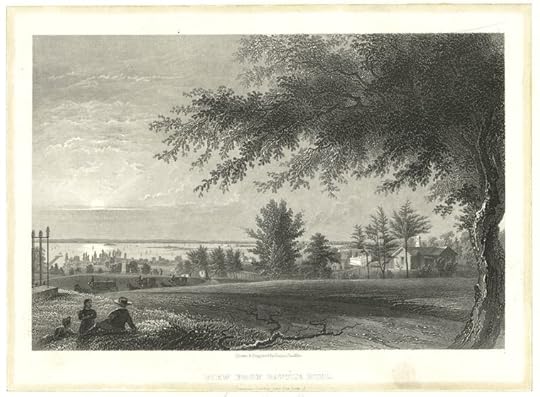
View From Battle Hill, a steel engraving by James Smillie. Battle Hill is the highest point in Brooklyn, New York. Located in what is now Greenwood Cemetery, Battle Hill was named for the fighting that occured on its slopes between American and British troops during the Battle of Brooklyn on August 27, 1776. James Smillie was born in Edinburgh, Scotland in 1807 and went to New York City in 1829. He engraved plates for the New York-Mirror also did engraving for the plates used to make bank-notes. Died in Poughkeepsie, New York in 1885.
Battle Hill sits within the 478-acre Green-Wood Cemetery. As the highest point within King’s County at 220 feet, it became a strategic location of the war.
Both British and American forces moved on the site in an attempt to seize it during the Battle of Brooklyn, resulting in brutal fighting and one of the highest-casualty clashes of the war.
Today there is a monument on the hill, where you’ll also catch spectacular views of the New York Harbor.
Sources: Wikipedia, 6sqft

View From Battle Hill, a steel engraving by James Smillie. Battle Hill is the highest point in Brooklyn, New York. Located in what is now Greenwood Cemetery, Battle Hill was named for the fighting that occured on its slopes between American and British troops during the Battle of Brooklyn on August 27, 1776. James Smillie was born in Edinburgh, Scotland in 1807 and went to New York City in 1829. He engraved plates for the New York-Mirror also did engraving for the plates used to make bank-notes. Died in Poughkeepsie, New York in 1885.
Battle Hill sits within the 478-acre Green-Wood Cemetery. As the highest point within King’s County at 220 feet, it became a strategic location of the war.
Both British and American forces moved on the site in an attempt to seize it during the Battle of Brooklyn, resulting in brutal fighting and one of the highest-casualty clashes of the war.
Today there is a monument on the hill, where you’ll also catch spectacular views of the New York Harbor.
Sources: Wikipedia, 6sqft
message 18:
by
Bentley, Group Founder, Leader, Chief
(last edited Jun 22, 2020 07:05PM)
(new)
-
rated it 4 stars
Battle Pass - present day Prospect Park

Battle Pass from the online collection of the Brooklyn Museum, via Wikipedia
'Considering the ferocity of the British attack on Battle Hill, American troops were unaware it wasn’t the main attack planned by the Brits. They also bombarded Battle Pass, sneaking up on American troops by coming over a different pass than the American general John Sullivan had anticipated.
Heavy casualties mounted between the Americans and British in what is now known as Prospect Park. General Sullivan was captured, but most of his troops retreated across what’s now known as the Long Meadow of the park.
Those troops—including the Maryland 400—escaped to the Vechte-Cortelyou House, which would be the site of the battle’s “final resistance.” There’s a stone marker within the park commemorating what happened.

Battle Pass Historic Marker
Foundry: Original plaque--Pitbladdo Monument Works, Inc., 242 25th Street, Brooklyn, NY; replacement plaque--U.S. Bronze, Hyde Park, NY
Donor: Battle Pass Chapter, Daughters of the American Revolution
Inscription: HISTORIC MARKER OF BATTLE PASS / AT THIS POINT THE OLD PORTE ROAD OR VALLEY GROVE ROAD / INTERSECTED THE LINE OF HILLS SEPARATING FLATBUSH FROM / BROOKLYN AND GOWANUS. IN THE BATTLE OF LONG ISLAND, AUGUST 27, 1776, THIS PASS WAS BARRICADED IN FRONT BY DONGAN OAK / AND OTHER OBSTRUCTIONS. IT WAS PROTECTED BY ARTILLERY ON / REDOUT HILL JUST TO THE EAST. HERE THE AMERICAN FORCES / STOOD THEIR GROUND AGAINST THE HESSIANS COMING FROM THE / SOUTH TILL FLANKED FROM THE RIVER BY A BODY OF BRITISH TROOPS. / GENERAL SULLIVAN WAS CAPTURED, BUT MOST OF HIS TROOPS / RETREATED ACROSS WHAT IS NOW THE LONG MEADOW, JOINING / THE MARYLAND AND OTHER TROOPS FOR THE FINAL RESISTANCE / NEAR THE OLD STONE HOUSE OF GOWANUS. /
Sources: Wikipedia, 6sqft, NYC Parks, Brooklyn Museum via Wikipedia

Battle Pass from the online collection of the Brooklyn Museum, via Wikipedia
'Considering the ferocity of the British attack on Battle Hill, American troops were unaware it wasn’t the main attack planned by the Brits. They also bombarded Battle Pass, sneaking up on American troops by coming over a different pass than the American general John Sullivan had anticipated.
Heavy casualties mounted between the Americans and British in what is now known as Prospect Park. General Sullivan was captured, but most of his troops retreated across what’s now known as the Long Meadow of the park.
Those troops—including the Maryland 400—escaped to the Vechte-Cortelyou House, which would be the site of the battle’s “final resistance.” There’s a stone marker within the park commemorating what happened.

Battle Pass Historic Marker
Foundry: Original plaque--Pitbladdo Monument Works, Inc., 242 25th Street, Brooklyn, NY; replacement plaque--U.S. Bronze, Hyde Park, NY
Donor: Battle Pass Chapter, Daughters of the American Revolution
Inscription: HISTORIC MARKER OF BATTLE PASS / AT THIS POINT THE OLD PORTE ROAD OR VALLEY GROVE ROAD / INTERSECTED THE LINE OF HILLS SEPARATING FLATBUSH FROM / BROOKLYN AND GOWANUS. IN THE BATTLE OF LONG ISLAND, AUGUST 27, 1776, THIS PASS WAS BARRICADED IN FRONT BY DONGAN OAK / AND OTHER OBSTRUCTIONS. IT WAS PROTECTED BY ARTILLERY ON / REDOUT HILL JUST TO THE EAST. HERE THE AMERICAN FORCES / STOOD THEIR GROUND AGAINST THE HESSIANS COMING FROM THE / SOUTH TILL FLANKED FROM THE RIVER BY A BODY OF BRITISH TROOPS. / GENERAL SULLIVAN WAS CAPTURED, BUT MOST OF HIS TROOPS / RETREATED ACROSS WHAT IS NOW THE LONG MEADOW, JOINING / THE MARYLAND AND OTHER TROOPS FOR THE FINAL RESISTANCE / NEAR THE OLD STONE HOUSE OF GOWANUS. /
Sources: Wikipedia, 6sqft, NYC Parks, Brooklyn Museum via Wikipedia
message 19:
by
Bentley, Group Founder, Leader, Chief
(last edited Jun 22, 2020 10:28PM)
(new)
-
rated it 4 stars
Vechte-Cortelyou-House (the Old Stone House in its spot now)
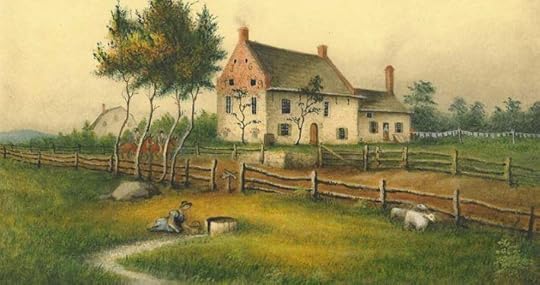
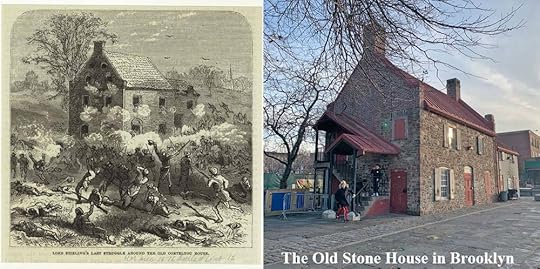
This Dutch farmhouse, built in 1699, was where the Maryland troops made two attacks against over 2,000 British troops.
The soldiers of the Maryland 400 perished in battle here, but were able to successfully hold back the British. The Vechte-Cortelyou House was destroyed in battle, but was rebuilt in 1934 as the Old Stone House, in Park Slope’s Washington Park.
The recreation Dutch farmhouse serves as a house museum and the best place to learn about Brooklyn’s role in the Revolutionary War.
More:
The Old Stone House was located in the Gowanus section of the town of Breukelen, one of the six small towns comprising Kings County. The name, Gowanus, may be derived from the Native American or the Dutch. Claes Arentsen Vechte and his son Hendrick Claessen Vechte built the Old Stone House in 1699.
Hendrick Claessen Vechte was a wealthy man. His will shows that he was a carpenter and a wheelwright, as well as a farmer. His son, Nicholas Vechte. was born in 1704 and lived at the Old Stone House with his wife, Abigail, through the Revolutionary War. Their extended family lived nearby. Like many of their neighbors, the Vechtes relied on enslaved Africans for labor.
Nicholas R. Cowenhoven, Nicholas Vechte’s grandson, sold the farm to Jacques Cortelyou in 1790. The Cortelyous sold the farm to Edwin Litchfield in 1852.
Sources: Wikipedia, 6sqft, NYC Parks, Brooklyn Historical Society, This Old Stone House


This Dutch farmhouse, built in 1699, was where the Maryland troops made two attacks against over 2,000 British troops.
The soldiers of the Maryland 400 perished in battle here, but were able to successfully hold back the British. The Vechte-Cortelyou House was destroyed in battle, but was rebuilt in 1934 as the Old Stone House, in Park Slope’s Washington Park.
The recreation Dutch farmhouse serves as a house museum and the best place to learn about Brooklyn’s role in the Revolutionary War.
More:
The Old Stone House was located in the Gowanus section of the town of Breukelen, one of the six small towns comprising Kings County. The name, Gowanus, may be derived from the Native American or the Dutch. Claes Arentsen Vechte and his son Hendrick Claessen Vechte built the Old Stone House in 1699.
Hendrick Claessen Vechte was a wealthy man. His will shows that he was a carpenter and a wheelwright, as well as a farmer. His son, Nicholas Vechte. was born in 1704 and lived at the Old Stone House with his wife, Abigail, through the Revolutionary War. Their extended family lived nearby. Like many of their neighbors, the Vechtes relied on enslaved Africans for labor.
Nicholas R. Cowenhoven, Nicholas Vechte’s grandson, sold the farm to Jacques Cortelyou in 1790. The Cortelyous sold the farm to Edwin Litchfield in 1852.
Sources: Wikipedia, 6sqft, NYC Parks, Brooklyn Historical Society, This Old Stone House
Fulton Ferry Landing, present day Brooklyn Bridge Park
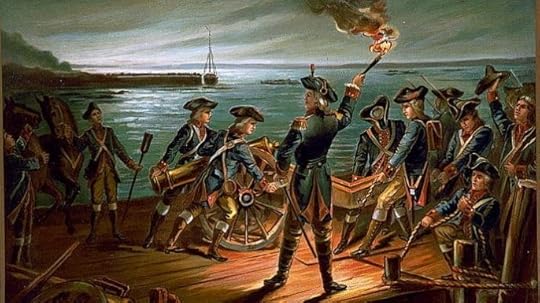
George Washington and his troops crossing the East River, via History.com
The series of devastating battles left some 9,000 Americans pinned against the East River. George Washington ordered his men to round up all the flat-bottomed boats they could find in the middle of a rainy, foggy night.
He then used his hastily assembled flotilla to silently ferry units across the river to Manhattan. Rags were used to muffle the sound of the oars, and campfires were left burning to deceive the British.
By the time the British finally realized what was happening, the troops had already made the crossing with most of their equipment and artillery.
Sources: Wikipedia, 6sqft, NYC Parks

George Washington and his troops crossing the East River, via History.com
The series of devastating battles left some 9,000 Americans pinned against the East River. George Washington ordered his men to round up all the flat-bottomed boats they could find in the middle of a rainy, foggy night.
He then used his hastily assembled flotilla to silently ferry units across the river to Manhattan. Rags were used to muffle the sound of the oars, and campfires were left burning to deceive the British.
By the time the British finally realized what was happening, the troops had already made the crossing with most of their equipment and artillery.
Sources: Wikipedia, 6sqft, NYC Parks
message 21:
by
Bentley, Group Founder, Leader, Chief
(last edited Jun 22, 2020 07:14PM)
(new)
-
rated it 4 stars
The Fascinating, Murky History of Brooklyn's Gowanus Canal
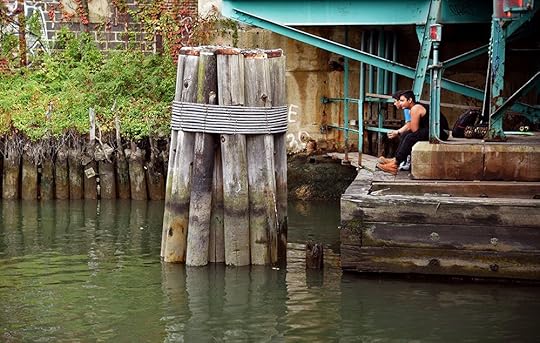
Link: https://ny.curbed.com/2015/10/15/9911...
More:
 by Joseph Alexiou (no photo)
by Joseph Alexiou (no photo)
Source: Curbed

Link: https://ny.curbed.com/2015/10/15/9911...
More:
 by Joseph Alexiou (no photo)
by Joseph Alexiou (no photo)Source: Curbed
message 22:
by
Bentley, Group Founder, Leader, Chief
(last edited Jun 22, 2020 10:26PM)
(new)
-
rated it 4 stars
First Maryland Regiment Mass Grave - Brooklyn, New York
The mass grave of a heroic Revolutionary War regiment sits below an empty lot near the Gowanus Canal

Link: https://www.atlasobscura.com/places/f...
BURIED IN A MASS GRAVE near the Gowanus Canal in Brooklyn are the remains of the 1st Maryland Regiment, a group of brave soldiers that changed the course of the Revolutionary War.
The Maryland Regiment was integral to the Battle of Brooklyn on August 27, 1776.
Vastly outnumbered against a force of 2,000 British, “The Maryland 400” as they became known bravely charged against the enemy, holed up in the Old Stone House, six times so that the rest of Washington’s army would have time to escape.
Only 10 returned to American lines, and 256 were dead, with another 100 either injured or taken prisoner.
The Maryland soldiers killed in the struggle were interred in a field in six trenches, an area that eventually became Third Avenue in Gowanus.
Their grave was originally marked with a memorial that stated: “Burial place of ye 256 Maryland soldiers who fell in ye combat at ye Cortelyou House on ye 27th day of August 1776.”
Yet as the years went by, their story and burial place faded from public memory.
However, not everyone has forgotten the Maryland Regiment, and their grave has been rediscovered where it remains in a fenced-off lot at the intersection of Third avenue and 9th Street in Brooklyn.
Despite previous plans for a memorial park, merely a simple placard on the adjacent American Legion building indicates the site from the street.
More:
Archaeologists Dig for Battle of Brooklyn Soldiers
Synopsis: America's revolution against British rule was fought most fiercely in the Battle of Brooklyn, one of the bloodiest engagements of the entire war. The colonialists' quest for freedom was saved when the famed Maryland 400 lost their lives while stopping the Red Coats. Now, archaeologists, not far from a Catholic Church in Gowanus, are surveying a site to determine if the heroes are buried there. Tim Harfmann has the story.
Link: https://youtu.be/0OxJLA7uw08
Link: https://ny.curbed.com/2017/3/22/15021...
Link: https://ny.curbed.com/2017/10/17/1648... (they find out it was not the burial area - who knows it could be under the cemetery)
Sources: Atlasobscura, Youtube, Current News, Curbed
The mass grave of a heroic Revolutionary War regiment sits below an empty lot near the Gowanus Canal

Link: https://www.atlasobscura.com/places/f...
BURIED IN A MASS GRAVE near the Gowanus Canal in Brooklyn are the remains of the 1st Maryland Regiment, a group of brave soldiers that changed the course of the Revolutionary War.
The Maryland Regiment was integral to the Battle of Brooklyn on August 27, 1776.
Vastly outnumbered against a force of 2,000 British, “The Maryland 400” as they became known bravely charged against the enemy, holed up in the Old Stone House, six times so that the rest of Washington’s army would have time to escape.
Only 10 returned to American lines, and 256 were dead, with another 100 either injured or taken prisoner.
The Maryland soldiers killed in the struggle were interred in a field in six trenches, an area that eventually became Third Avenue in Gowanus.
Their grave was originally marked with a memorial that stated: “Burial place of ye 256 Maryland soldiers who fell in ye combat at ye Cortelyou House on ye 27th day of August 1776.”
Yet as the years went by, their story and burial place faded from public memory.
However, not everyone has forgotten the Maryland Regiment, and their grave has been rediscovered where it remains in a fenced-off lot at the intersection of Third avenue and 9th Street in Brooklyn.
Despite previous plans for a memorial park, merely a simple placard on the adjacent American Legion building indicates the site from the street.
More:
Archaeologists Dig for Battle of Brooklyn Soldiers
Synopsis: America's revolution against British rule was fought most fiercely in the Battle of Brooklyn, one of the bloodiest engagements of the entire war. The colonialists' quest for freedom was saved when the famed Maryland 400 lost their lives while stopping the Red Coats. Now, archaeologists, not far from a Catholic Church in Gowanus, are surveying a site to determine if the heroes are buried there. Tim Harfmann has the story.
Link: https://youtu.be/0OxJLA7uw08
Link: https://ny.curbed.com/2017/3/22/15021...
Link: https://ny.curbed.com/2017/10/17/1648... (they find out it was not the burial area - who knows it could be under the cemetery)
Sources: Atlasobscura, Youtube, Current News, Curbed
message 23:
by
Bentley, Group Founder, Leader, Chief
(last edited Jun 22, 2020 10:11PM)
(new)
-
rated it 4 stars
More:
Historical Markers:
Link:https://www.hmdb.org/m.asp?m=30752
Where Is Unmarked Burial Place From 1776 Battle of Brooklyn?
By Chris Carola • Published February 15, 2016
Link: https://www.nbcnewyork.com/news/local...
The Old Stone House - some great little videos of the area then and now - with John Turturro - Brooklyn was beautiful!
Link: https://theoldstonehouse.org/history/...
The Battle of Brooklyn, August 27-29, 1776
A Walking Guide to Sites and Monument - great guide
Link: https://theoldstonehouse.org/wp-conte...
Did Generals Mismanage the Battle of Brooklyn?
Link: https://allthingsliberty.com/2017/04/...
The Revolutionary War in Four Minutes: Battle of Brooklyn
Civil War Trust - Jeff Richman explains the pivotal Battle of Brooklyn, which took place just weeks after the signing of the Declaration of Independence. (nice little video)
Link: https://www.battlefields.org/learn/vi...
Source: NBCNewYork, HMDB, The Old Stone House, Journal of the American Revolution, The American Battlefield Trust
Historical Markers:
Link:https://www.hmdb.org/m.asp?m=30752
Where Is Unmarked Burial Place From 1776 Battle of Brooklyn?
By Chris Carola • Published February 15, 2016
Link: https://www.nbcnewyork.com/news/local...
The Old Stone House - some great little videos of the area then and now - with John Turturro - Brooklyn was beautiful!
Link: https://theoldstonehouse.org/history/...
The Battle of Brooklyn, August 27-29, 1776
A Walking Guide to Sites and Monument - great guide
Link: https://theoldstonehouse.org/wp-conte...
Did Generals Mismanage the Battle of Brooklyn?
Link: https://allthingsliberty.com/2017/04/...
The Revolutionary War in Four Minutes: Battle of Brooklyn
Civil War Trust - Jeff Richman explains the pivotal Battle of Brooklyn, which took place just weeks after the signing of the Declaration of Independence. (nice little video)
Link: https://www.battlefields.org/learn/vi...
Source: NBCNewYork, HMDB, The Old Stone House, Journal of the American Revolution, The American Battlefield Trust
message 24:
by
Bentley, Group Founder, Leader, Chief
(last edited Jun 22, 2020 11:22PM)
(new)
-
rated it 4 stars
Mordecai Gist
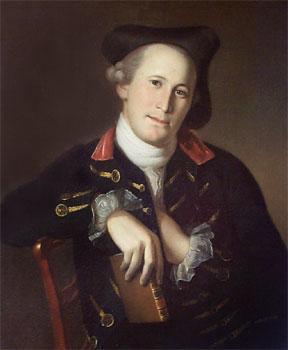
Mordecai Gist (1743-1792), a native of Maryland, served valiantly in the Battle of Brooklyn in 1776 - Wikimedia Commons
Mordecai Gist's Maryland Macaronis
The Maryland Battalion and the Battle of Long Island
At the corner of Meeting and Broad Streets in Charleston, South Carolina a bronze weather beaten plaque affixed to the walls of Saint Michael’s Episcopal Churchyard reads, “Here in the churchyard of St. Michael’s lie buried two signers of the U.S. Constitution, Charles Cotesworth Pinckney (1746-1825) Lawyer and Legislator, Major General U.S. Army, Minister to France, Presidential Candidate. John Rutledge (1739-1800) Lawyer and Statesman, Governor of South Carolina, Chief Justice of the U.S. Their years of public service, 1762-1825, saw both State and nation well on the road to greatness.” Not too far from the first plaque is affixed a more recent plaque erected in 1961 by the National Park Service declaring that the church and its churchyard are a National Historic Landmark.
Behind these mottled with mold, red brick walls also lie the remains of a lesser known American patriot, General Mordecai Gist, a son not of South Carolina, but rather Maryland. His headstone reads the following: “To the Memory of General Mordecai Gist. While in command of the First Maryland Battalion he so valiantly covered the retreat of American forces at the Battle of Long Island, August 1776. That his troops became known as the Bayonets of the Revolution” A Tribute from the Sons of the American Revolution.
So who was Mordecai Gist and why has he been lost to the dustbin of American history? Perhaps it is because, in spite of his personal wealth and fortune he put country before self and like many others who served the Continental call died early at age 50 figuring his service would speak for itself.
Gist was born in Baltimore, Maryland in 1743 to Thomas and Susan Gist. His father had made a fortune in commercial trade in the bustling seaport, including helping layout the city, and Gist would grow up and learn the trades of a surveyor, working with George Washington to help survey the American frontier only fifty miles removed from the Atlantic seaboard.
Because of his wealth and family prominence Gist was able to help raise, recruit, and equip at the beginning of the American Revolution an independent militia company known as the Baltimore Independent Company.
One thing that set them apart from other militia companies and units raised in the colonies is that Gist’s men were supplied with bayonets.
They were also well trained and disciplined before they had their baptism of fire at the Battle of Long Island. This would serve them well on that fateful day. By the time Gist’s men reached New York in the summer of 1776 they had been designated the 5th Maryland Infantry.
While Gist had been elected as the captain of his unit (a practice not uncommon in colonial militia units) Congress promoted him to Major General in the Continental Army to which the 5th Maryland had been attached.
Because they were well dressed and well equipped, the unit earned the sobriquet, “the Dandy 5th” When they joined the bulk of Washington’s command in New York they were dubbed “macaronis” a pejorative term of the age equivalent of “dandy.”
By the end of the fateful Battle of Brooklyn the term “dandy” had a different meaning for Gist and his fellow Marylanders.
After the British evacuated Boston in March 1776, George Washington presciently deduced that the next major British attack would be made against New York City. He ordered his nascent army out of their quarters around Boston and moved to defend New York. The commander had been right.
In July 1776, the largest British assault force appeared on the horizon off of New York Harbor. One Continental post said from his position on Staten Island that, “It looked like London all afloat.”
The British encountering little resistance disembarked on Staten Island from where they would launch their attack on New York City by way of Long Island and Brooklyn to the East of Manhattan.
Gist’s claim to fame rested on his men’s military attitude and disposition of August 27, 1776. The 5th Maryland had been assigned to William Smallwood’s Maryland Battalion upon reaching New York. Smallwood’s Battalion represented men from across the State of Maryland. Prior to the Battle of Brooklyn, Smallwood’s Battalion was put under the command of General William Lord Stirling.
The overall command of American forces fell on the shoulders of Washington’s most trusted general, Nathanael Greene, but Greene fell ill and was incapacitated, so Washington turned command of his army on Long Island over to General John Sullivan. Sullivan lacked Greene’s tactical skills and that alone may have made the difference in the final outcome.
Washington’s Plan was to form two lines of defense one on Gowanus Heights a rise several hundred yards in front of Washington’s main defensive line on Brooklyn Heights. His total disposition of troops for the battle was 6,000 men. The command of the first American line was given to Sullivan and Stirling.
The defensive position on Brooklyn Heights was led by the aged and grizzled hero of the French and Indian War and the Battle of Bunker Hill General Israel Putnam, who Washington also directed to overseeing the general command of American forces. Washington’s strategy was to hope that Stirling and Sullivan’s line on Gowanus Heights would blunt the British advance and that Putnam’s men would hold their line.
Remainder of article:
https://www.battlefields.org/learn/ar...
More:
Washington's Immortals at The Battle of Brooklyn
Link: https://www.battlefields.org/learn/vi... (great video)
Source: American Battlefield Trust

Mordecai Gist (1743-1792), a native of Maryland, served valiantly in the Battle of Brooklyn in 1776 - Wikimedia Commons
Mordecai Gist's Maryland Macaronis
The Maryland Battalion and the Battle of Long Island
At the corner of Meeting and Broad Streets in Charleston, South Carolina a bronze weather beaten plaque affixed to the walls of Saint Michael’s Episcopal Churchyard reads, “Here in the churchyard of St. Michael’s lie buried two signers of the U.S. Constitution, Charles Cotesworth Pinckney (1746-1825) Lawyer and Legislator, Major General U.S. Army, Minister to France, Presidential Candidate. John Rutledge (1739-1800) Lawyer and Statesman, Governor of South Carolina, Chief Justice of the U.S. Their years of public service, 1762-1825, saw both State and nation well on the road to greatness.” Not too far from the first plaque is affixed a more recent plaque erected in 1961 by the National Park Service declaring that the church and its churchyard are a National Historic Landmark.
Behind these mottled with mold, red brick walls also lie the remains of a lesser known American patriot, General Mordecai Gist, a son not of South Carolina, but rather Maryland. His headstone reads the following: “To the Memory of General Mordecai Gist. While in command of the First Maryland Battalion he so valiantly covered the retreat of American forces at the Battle of Long Island, August 1776. That his troops became known as the Bayonets of the Revolution” A Tribute from the Sons of the American Revolution.
So who was Mordecai Gist and why has he been lost to the dustbin of American history? Perhaps it is because, in spite of his personal wealth and fortune he put country before self and like many others who served the Continental call died early at age 50 figuring his service would speak for itself.
Gist was born in Baltimore, Maryland in 1743 to Thomas and Susan Gist. His father had made a fortune in commercial trade in the bustling seaport, including helping layout the city, and Gist would grow up and learn the trades of a surveyor, working with George Washington to help survey the American frontier only fifty miles removed from the Atlantic seaboard.
Because of his wealth and family prominence Gist was able to help raise, recruit, and equip at the beginning of the American Revolution an independent militia company known as the Baltimore Independent Company.
One thing that set them apart from other militia companies and units raised in the colonies is that Gist’s men were supplied with bayonets.
They were also well trained and disciplined before they had their baptism of fire at the Battle of Long Island. This would serve them well on that fateful day. By the time Gist’s men reached New York in the summer of 1776 they had been designated the 5th Maryland Infantry.
While Gist had been elected as the captain of his unit (a practice not uncommon in colonial militia units) Congress promoted him to Major General in the Continental Army to which the 5th Maryland had been attached.
Because they were well dressed and well equipped, the unit earned the sobriquet, “the Dandy 5th” When they joined the bulk of Washington’s command in New York they were dubbed “macaronis” a pejorative term of the age equivalent of “dandy.”
By the end of the fateful Battle of Brooklyn the term “dandy” had a different meaning for Gist and his fellow Marylanders.
After the British evacuated Boston in March 1776, George Washington presciently deduced that the next major British attack would be made against New York City. He ordered his nascent army out of their quarters around Boston and moved to defend New York. The commander had been right.
In July 1776, the largest British assault force appeared on the horizon off of New York Harbor. One Continental post said from his position on Staten Island that, “It looked like London all afloat.”
The British encountering little resistance disembarked on Staten Island from where they would launch their attack on New York City by way of Long Island and Brooklyn to the East of Manhattan.
Gist’s claim to fame rested on his men’s military attitude and disposition of August 27, 1776. The 5th Maryland had been assigned to William Smallwood’s Maryland Battalion upon reaching New York. Smallwood’s Battalion represented men from across the State of Maryland. Prior to the Battle of Brooklyn, Smallwood’s Battalion was put under the command of General William Lord Stirling.
The overall command of American forces fell on the shoulders of Washington’s most trusted general, Nathanael Greene, but Greene fell ill and was incapacitated, so Washington turned command of his army on Long Island over to General John Sullivan. Sullivan lacked Greene’s tactical skills and that alone may have made the difference in the final outcome.
Washington’s Plan was to form two lines of defense one on Gowanus Heights a rise several hundred yards in front of Washington’s main defensive line on Brooklyn Heights. His total disposition of troops for the battle was 6,000 men. The command of the first American line was given to Sullivan and Stirling.
The defensive position on Brooklyn Heights was led by the aged and grizzled hero of the French and Indian War and the Battle of Bunker Hill General Israel Putnam, who Washington also directed to overseeing the general command of American forces. Washington’s strategy was to hope that Stirling and Sullivan’s line on Gowanus Heights would blunt the British advance and that Putnam’s men would hold their line.
Remainder of article:
https://www.battlefields.org/learn/ar...
More:
Washington's Immortals at The Battle of Brooklyn
Link: https://www.battlefields.org/learn/vi... (great video)
Source: American Battlefield Trust
message 25:
by
Bentley, Group Founder, Leader, Chief
(last edited Jun 22, 2020 11:31PM)
(new)
-
rated it 4 stars
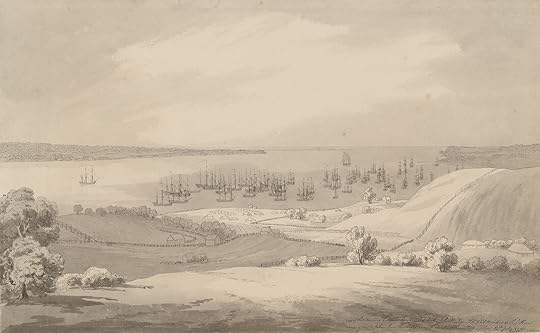
This sketch by a British officer on Staten Island shows part of the king’s fleet anchored in the Narrows, across from Long Island on July 12, 1776. Admiral Howe’s flagship, Eagle, can be seen in the middle distance, approaching from the open sea.
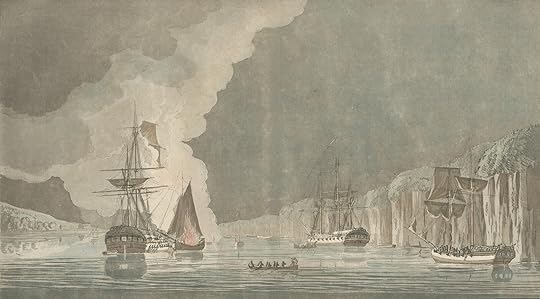
On the night of August 16, 1776, two American vessels crammed with flammables attacked a British flotilla anchored in the Hudson River. The fire ships destroyed an enemy tender, but Royal Navy seamen kept flames from spreading through the sails of the frigate Phoenix.
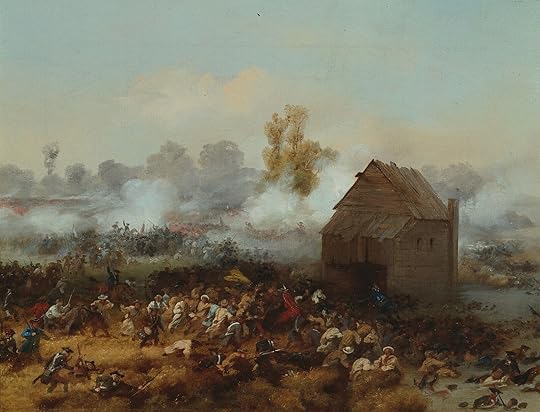
52. This nineteenth-century painting by Alonzo Chappel shows the chaotic flight of American troops toward Gowanus Creek near Brooklyn on August 27, 1776, after being all but encircled by the British. “We were drove with much precipitation and confusion,” an American major later acknowledged.

Designed and built by David Bushnell of Connecticut, the Turtle was described as “a machine altogether different from anything hitherto devised by the art of man.” Just before midnight on September 6, 1776, the submersible “water machine” was launched from Manhattan’s southern tip to destroy the Eagle, Admiral Howe’s flagship.
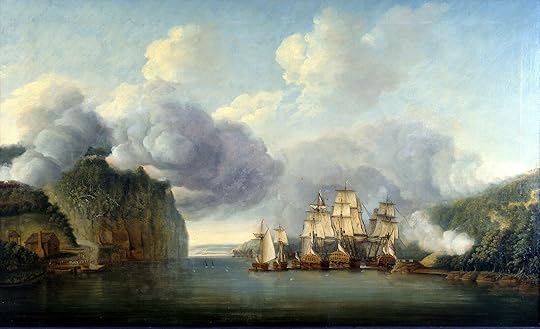
Determined to control the Hudson, a trio of British warships accompanied by tenders sailed upriver in early October 1776. Despite underwater obstructions and heavy fire from American batteries, the flotilla managed to pass Fort Washington on Manhattan to the right and Fort Lee in New Jersey to the left. The river was actually much wider than depicted here.
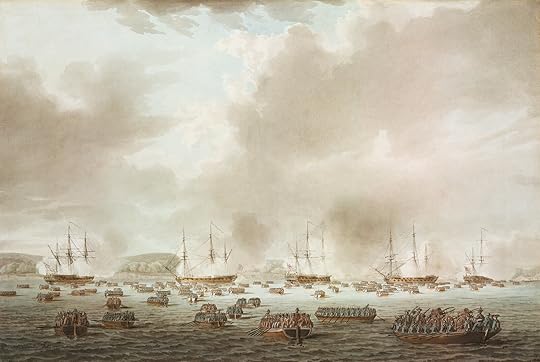
On September 15, 1776, five British men-of-war on the East River bombarded American entrenchments along Kip’s Bay, a shallow indentation on the Manhattan shoreline. At the same time, several thousand British and German troops crossed the river on flatboats and soon sent the rebels fleeing.
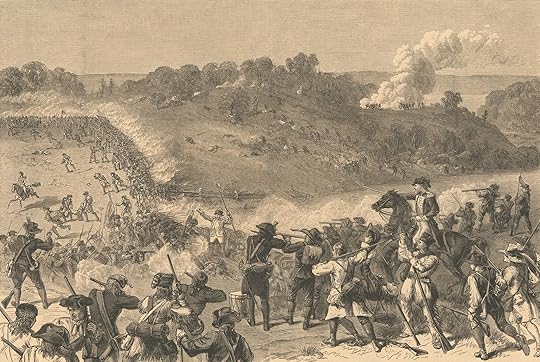
A day after the debacle at Kip’s Bay, the American commander in chief lured unwary redcoats into a bloody ambush near Harlem Heights along the Hudson. “If this was a scheme of Washington’s,” a British officer admitted, “it certainly was well-concerted.”
Nathanael Greene
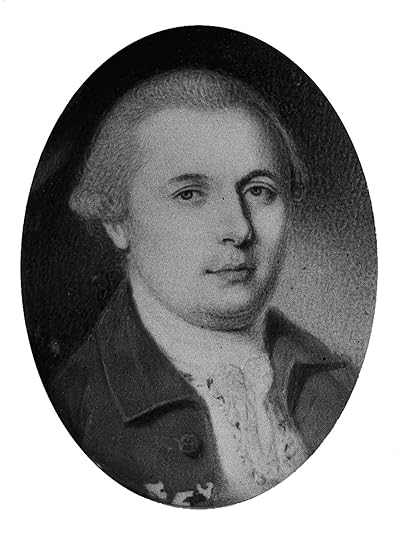
“I was educated a Quaker, amongst the most superstitious sort,” wrote Nathanael Greene, son of a Rhode Island anchorsmith. The youngest Continental general, he soon became a Washington favorite for his decisive mind and rigorous discipline, notwithstanding a catastrophic error in judgment at Fort Washington in November 1776.ecisive mind and rigorous discipline, notwithstanding a catastrophic error in judgment at Fort Washington in November 1776.,-Nathanael-(1)

“I was educated a Quaker, amongst the most superstitious sort,” wrote Nathanael Greene, son of a Rhode Island anchorsmith. The youngest Continental general, he soon became a Washington favorite for his decisive mind and rigorous discipline, notwithstanding a catastrophic error in judgment at Fort Washington in November 1776.ecisive mind and rigorous discipline, notwithstanding a catastrophic error in judgment at Fort Washington in November 1776.,-Nathanael-(1)
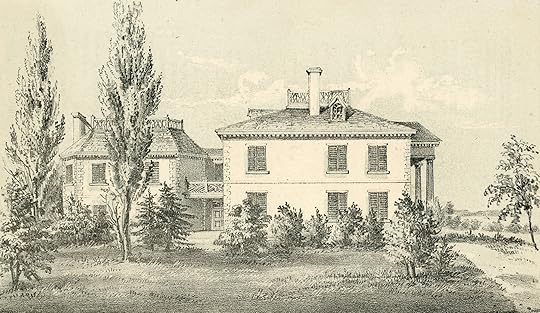
This loyalist’s mansion served as Washington’s headquarters for five weeks in northern Manhattan before the Americans finally retreated north into Westchester County. Court-martial boards sometimes convened in the octagonal parlor in the rear of the house.
message 34:
by
Bentley, Group Founder, Leader, Chief
(last edited Jun 22, 2020 11:45PM)
(new)
-
rated it 4 stars
Major General John Sullivan

Major General John Sullivan was a bombastic New Hampshire lawyer, notorious for suing his debtors. He helped redeem unimpressive military performances in Canada and on Long Island by leading the right wing of Washington’s attack on Trenton.

Major General John Sullivan was a bombastic New Hampshire lawyer, notorious for suing his debtors. He helped redeem unimpressive military performances in Canada and on Long Island by leading the right wing of Washington’s attack on Trenton.
Major General James Grant
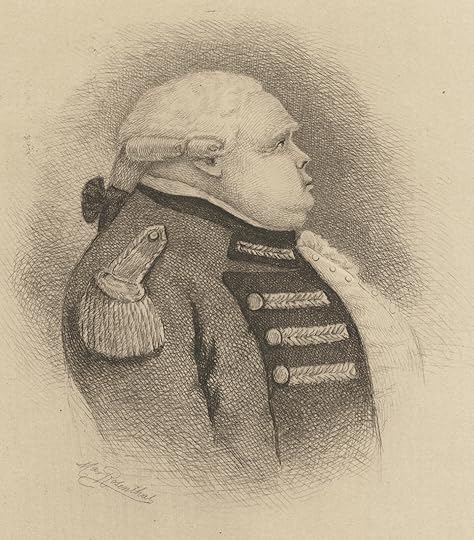
Major General James Grant, who had led the British left wing at Long Island, commanded royal forces in New Jersey after General Howe’s return to New York in mid-December 1776. A stout, gouty former governor of East Florida, Grant was described as “a gamester, a glutton, and an epicure.”

Major General James Grant, who had led the British left wing at Long Island, commanded royal forces in New Jersey after General Howe’s return to New York in mid-December 1776. A stout, gouty former governor of East Florida, Grant was described as “a gamester, a glutton, and an epicure.”
Admiral Richard Howe
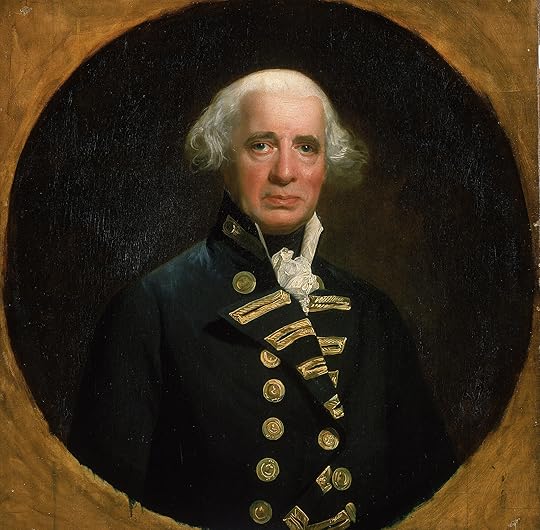
“A pretty man does not make a good portrait,” the artist Joshua Reynolds said admiringly of Admiral Richard Howe. Known as “Black Dick” for his swarthy complexion, Howe was already among Britain’s most celebrated fighting captains when he arrived in New York to command the Royal Navy in North America.

“A pretty man does not make a good portrait,” the artist Joshua Reynolds said admiringly of Admiral Richard Howe. Known as “Black Dick” for his swarthy complexion, Howe was already among Britain’s most celebrated fighting captains when he arrived in New York to command the Royal Navy in North America.
message 37:
by
Bentley, Group Founder, Leader, Chief
(last edited Jun 22, 2020 11:52PM)
(new)
-
rated it 4 stars
Major General Henry Clinton
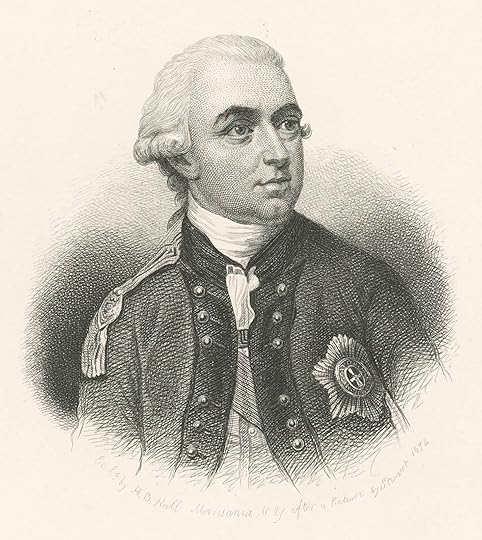
Major General Henry Clinton would serve longer in the American war than any British general. A gifted tactician and a talented violinist with a passion for Haydn, he instinctively expected the worst, from both people and fate. “Furies were at work on his psyche,” his biographer later wrote.

Major General Henry Clinton would serve longer in the American war than any British general. A gifted tactician and a talented violinist with a passion for Haydn, he instinctively expected the worst, from both people and fate. “Furies were at work on his psyche,” his biographer later wrote.
Isaac Putnam
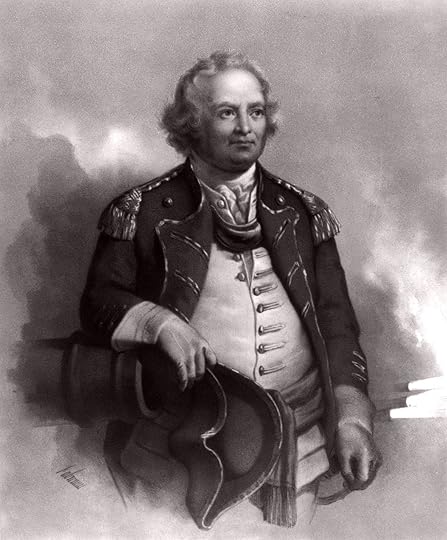
Israel Putnam, popularly known as "Old Put", was an American army general officer who fought with distinction at the Battle of Bunker Hill during the American Revolutionary War.
He also served notably as an officer with Rogers' Rangers during the French and Indian War, when he was captured by Mohawk warriors.
Born: January 7, 1718, Danvers, MA
Died: May 29, 1790, Brooklyn, CT
Battles/wars: French and Indian War; Pontiac's War; American Revolutionary War
Place of burial: South Cemetery, Brooklyn, CT
Children: Daniel Putnam, Peter Schuyler Putnam, Israel Putnam, Jr.
Remainder of article:
https://en.wikipedia.org/wiki/Israel_...
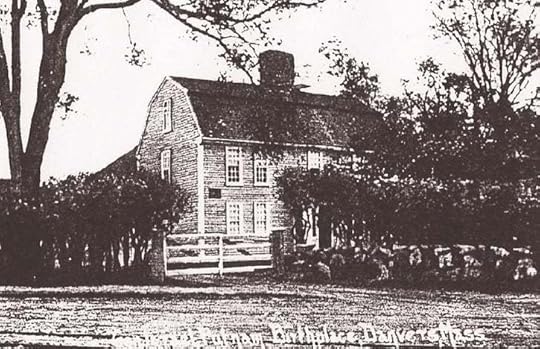
Putnam House in Danvers

The nine-by-twenty-two foot oil on canvass depression-era work of artist James Henry Daugherty titled "The Life and Times of General Israel Putnam of Connecticut," hangs on the wall in Greenwich Library, Conn.
https://www.greenwichtime.com/local/a...
More:
https://www.connecticutsar.org/israel...
Danvers Historical Society Votes to Hand Over Putnam House
https://danvers.wickedlocal.com/news/...
 by Increase N. Tarbox (no photo)
by Increase N. Tarbox (no photo)
 by William Cutter (no photo)
by William Cutter (no photo)
 by David Humphreys (no photo)
by David Humphreys (no photo)
 by Charles H.L. Johnston (no photo)
by Charles H.L. Johnston (no photo)
 by George Canning Hill (no photo)
by George Canning Hill (no photo)
 by Robert Ernest Hubbard (no photo)
by Robert Ernest Hubbard (no photo)
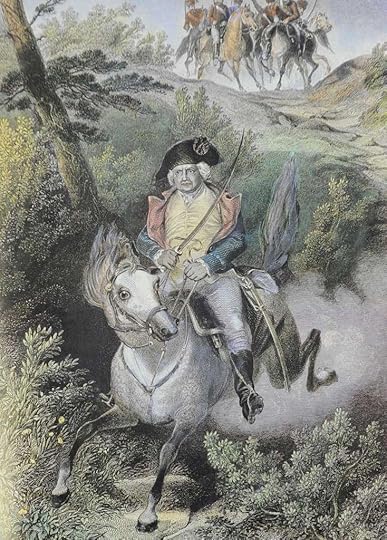

Israel Putnam, popularly known as "Old Put", was an American army general officer who fought with distinction at the Battle of Bunker Hill during the American Revolutionary War.
He also served notably as an officer with Rogers' Rangers during the French and Indian War, when he was captured by Mohawk warriors.
Born: January 7, 1718, Danvers, MA
Died: May 29, 1790, Brooklyn, CT
Battles/wars: French and Indian War; Pontiac's War; American Revolutionary War
Place of burial: South Cemetery, Brooklyn, CT
Children: Daniel Putnam, Peter Schuyler Putnam, Israel Putnam, Jr.
Remainder of article:
https://en.wikipedia.org/wiki/Israel_...

Putnam House in Danvers

The nine-by-twenty-two foot oil on canvass depression-era work of artist James Henry Daugherty titled "The Life and Times of General Israel Putnam of Connecticut," hangs on the wall in Greenwich Library, Conn.
https://www.greenwichtime.com/local/a...
More:
https://www.connecticutsar.org/israel...
Danvers Historical Society Votes to Hand Over Putnam House
https://danvers.wickedlocal.com/news/...
 by Increase N. Tarbox (no photo)
by Increase N. Tarbox (no photo) by William Cutter (no photo)
by William Cutter (no photo) by David Humphreys (no photo)
by David Humphreys (no photo) by Charles H.L. Johnston (no photo)
by Charles H.L. Johnston (no photo) by George Canning Hill (no photo)
by George Canning Hill (no photo) by Robert Ernest Hubbard (no photo)
by Robert Ernest Hubbard (no photo)
Isaac Putnam (continued)
Battle of Bunker Hill
By the eve of the American Revolution, Putnam had become a relatively prosperous farmer and tavern keeper, with more than a local reputation for his previous exploits.
On April 20, 1775, while plowing one of his fields with his son, he received news of the Battle of Lexington and Concord that started the war the day before. He literally "came off the plow", leaving it in the field and riding 100 miles (160 km) in eight hours, reaching Cambridge the next day and offering his services to the Patriot cause.
Putnam was named a major general, making him second in rank to General Artemas Ward in the Army of Observation, which preceded the founding of the Continental Army.
Putnam was one of the primary figures at the Battle of Bunker Hill in June 1775, both in its planning and on the battlefield. During the battle, Putnam may have ordered William Prescott to tell his troops, "Don't fire until you see the whites of their eyes."
It is debated exactly who said these words first; they are attributed to a number of officers.
This command has since become one of the American Revolution's notable quotations. It was given to make the best use of the low ammunition stocks that the troops had.
In the planning for the Battle of Bunker Hill, Putnam was likely the one who argued in favor of also fortifying the adjacent hill, which later became known as "Breed's Hill".
This hill was closer to Boston, and from the hill cannons could fire on the British forces in Boston, forcing them to come out and attack the hill.
The British soldiers were mowed down as they marched toward the American fortifications. However, the Americans ran out of powder and were eventually forced to retreat. American casualties were 449, while British casualties were 1,054. By the standard of the day the Americans lost, since they gave up the ground.
However, Continental Army Brigadier General Nathanael Greene wrote to his brother that "I wish we could sell them another hill, at the same price."
Years after the battle, and after Putnam's death, he was accused by Henry Dearborn of failing to supply reinforcements and even of cowardice during the battle. The accusations created a long-standing controversy among veterans, family, friends, and historians. People were shocked by the rancor of the attack, and this prompted a forceful response from defenders of Putnam, including such notables as John and Abigail Adams.
Historian Harold Murdock wrote that Dearborn's account "abounds in absurd misstatements and amazing flights of imagination." The Dearborn attack received considerable attention because at the time he was in the middle of considerable controversy himself.
Dearborn (who had attacked Putnam) had been relieved of one of the top commands in the War of 1812 due to his mistakes. He had also been nominated to serve as Secretary of War by President James Monroe, but was rejected by the United States Senate (which was the first time that the Senate had voted against confirming a presidential cabinet choice).
Source: Wikipedia
Battle of Bunker Hill
By the eve of the American Revolution, Putnam had become a relatively prosperous farmer and tavern keeper, with more than a local reputation for his previous exploits.
On April 20, 1775, while plowing one of his fields with his son, he received news of the Battle of Lexington and Concord that started the war the day before. He literally "came off the plow", leaving it in the field and riding 100 miles (160 km) in eight hours, reaching Cambridge the next day and offering his services to the Patriot cause.
Putnam was named a major general, making him second in rank to General Artemas Ward in the Army of Observation, which preceded the founding of the Continental Army.
Putnam was one of the primary figures at the Battle of Bunker Hill in June 1775, both in its planning and on the battlefield. During the battle, Putnam may have ordered William Prescott to tell his troops, "Don't fire until you see the whites of their eyes."
It is debated exactly who said these words first; they are attributed to a number of officers.
This command has since become one of the American Revolution's notable quotations. It was given to make the best use of the low ammunition stocks that the troops had.
In the planning for the Battle of Bunker Hill, Putnam was likely the one who argued in favor of also fortifying the adjacent hill, which later became known as "Breed's Hill".
This hill was closer to Boston, and from the hill cannons could fire on the British forces in Boston, forcing them to come out and attack the hill.
The British soldiers were mowed down as they marched toward the American fortifications. However, the Americans ran out of powder and were eventually forced to retreat. American casualties were 449, while British casualties were 1,054. By the standard of the day the Americans lost, since they gave up the ground.
However, Continental Army Brigadier General Nathanael Greene wrote to his brother that "I wish we could sell them another hill, at the same price."
Years after the battle, and after Putnam's death, he was accused by Henry Dearborn of failing to supply reinforcements and even of cowardice during the battle. The accusations created a long-standing controversy among veterans, family, friends, and historians. People were shocked by the rancor of the attack, and this prompted a forceful response from defenders of Putnam, including such notables as John and Abigail Adams.
Historian Harold Murdock wrote that Dearborn's account "abounds in absurd misstatements and amazing flights of imagination." The Dearborn attack received considerable attention because at the time he was in the middle of considerable controversy himself.
Dearborn (who had attacked Putnam) had been relieved of one of the top commands in the War of 1812 due to his mistakes. He had also been nominated to serve as Secretary of War by President James Monroe, but was rejected by the United States Senate (which was the first time that the Senate had voted against confirming a presidential cabinet choice).
Source: Wikipedia
General Charles Cornwallis - First Marquis of Cornwallis
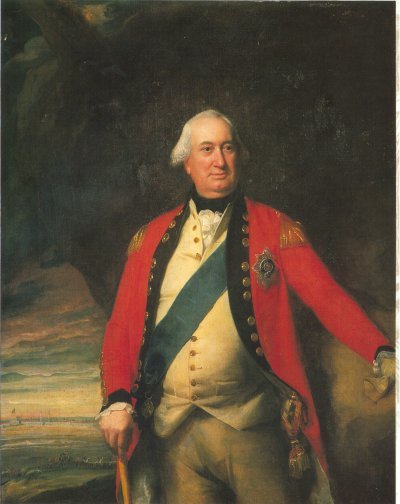
Charles Cornwallis, First Marquis of Cornwallis (1738-1805) - portrait by John Singleton Copley - First Foot Guards
Charles Cornwallis, 1st Marquess Cornwallis, KG, PC (31 December 1738 – 5 October 1805), styled Viscount Brome between 1753 and 1762 and known as The Earl Cornwallis between 1762 and 1792, was a British Army general and official. In the United States and the United Kingdom he is best remembered as one of the leading British generals in the American War of Independence.
His surrender in 1781 to a combined American and French force at the Siege of Yorktown ended significant hostilities in North America. He later served as a civil and military governor in Ireland, where he helped bring about the Act of Union; and in India, where he helped enact the Cornwallis Code and the Permanent Settlement.
Born into an aristocratic family and educated at Eton and Cambridge, Cornwallis joined the army in 1757, seeing action in the Seven Years' War. Upon his father's death in 1762 he became Earl Cornwallis and entered the House of Lords.
From 1766 until 1805 he was Colonel of the 33rd Regiment of Foot
He next saw military action in 1776 in the American War of Independence. Active in the advance forces of many campaigns, in 1780 he inflicted an embarrassing defeat on the American army at the Battle of Camden.
He also commanded British forces in the March 1781 Pyrrhic victory at Guilford Court House. Cornwallis surrendered his army at Yorktown in October 1781 after an extended campaign through the Southern states, marked by disagreements between him and his superior, General Sir Henry Clinton.
Despite this defeat, Cornwallis retained the confidence of successive British governments and continued to enjoy an active career. Knighted in 1786, he was in that year appointed to be Governor-General and commander-in-chief in India. There he enacted numerous significant reforms within the East India Company and its territories, including the Cornwallis Code, part of which implemented important land taxation reforms known as the Permanent Settlement.
From 1789 to 1792 he led British and Company forces in the Third Anglo-Mysore War to defeat the Mysorean ruler Tipu Sultan.
Returning to Britain in 1794, Cornwallis was given the post of Master-General of the Ordnance.
In 1798 he was appointed Lord Lieutenant and Commander-in-chief of Ireland, where he oversaw the response to the 1798 Irish Rebellion, including a French invasion of Ireland, and was instrumental in bringing about the Union of Great Britain and Ireland. Following his Irish service, Cornwallis was the chief British signatory to the 1802 Treaty of Amiens and was reappointed to India in 1805. He died in India not long after his arrival.
Remainder of article:
https://en.wikipedia.org/wiki/Charles...
Source: Wikipedia

Charles Cornwallis, First Marquis of Cornwallis (1738-1805) - portrait by John Singleton Copley - First Foot Guards
Charles Cornwallis, 1st Marquess Cornwallis, KG, PC (31 December 1738 – 5 October 1805), styled Viscount Brome between 1753 and 1762 and known as The Earl Cornwallis between 1762 and 1792, was a British Army general and official. In the United States and the United Kingdom he is best remembered as one of the leading British generals in the American War of Independence.
His surrender in 1781 to a combined American and French force at the Siege of Yorktown ended significant hostilities in North America. He later served as a civil and military governor in Ireland, where he helped bring about the Act of Union; and in India, where he helped enact the Cornwallis Code and the Permanent Settlement.
Born into an aristocratic family and educated at Eton and Cambridge, Cornwallis joined the army in 1757, seeing action in the Seven Years' War. Upon his father's death in 1762 he became Earl Cornwallis and entered the House of Lords.
From 1766 until 1805 he was Colonel of the 33rd Regiment of Foot
He next saw military action in 1776 in the American War of Independence. Active in the advance forces of many campaigns, in 1780 he inflicted an embarrassing defeat on the American army at the Battle of Camden.
He also commanded British forces in the March 1781 Pyrrhic victory at Guilford Court House. Cornwallis surrendered his army at Yorktown in October 1781 after an extended campaign through the Southern states, marked by disagreements between him and his superior, General Sir Henry Clinton.
Despite this defeat, Cornwallis retained the confidence of successive British governments and continued to enjoy an active career. Knighted in 1786, he was in that year appointed to be Governor-General and commander-in-chief in India. There he enacted numerous significant reforms within the East India Company and its territories, including the Cornwallis Code, part of which implemented important land taxation reforms known as the Permanent Settlement.
From 1789 to 1792 he led British and Company forces in the Third Anglo-Mysore War to defeat the Mysorean ruler Tipu Sultan.
Returning to Britain in 1794, Cornwallis was given the post of Master-General of the Ordnance.
In 1798 he was appointed Lord Lieutenant and Commander-in-chief of Ireland, where he oversaw the response to the 1798 Irish Rebellion, including a French invasion of Ireland, and was instrumental in bringing about the Union of Great Britain and Ireland. Following his Irish service, Cornwallis was the chief British signatory to the 1802 Treaty of Amiens and was reappointed to India in 1805. He died in India not long after his arrival.
Remainder of article:
https://en.wikipedia.org/wiki/Charles...
Source: Wikipedia
message 41:
by
Bentley, Group Founder, Leader, Chief
(last edited Jun 23, 2020 01:09AM)
(new)
-
rated it 4 stars
Lieutenant General Sir William Erskine, 1st Baronet
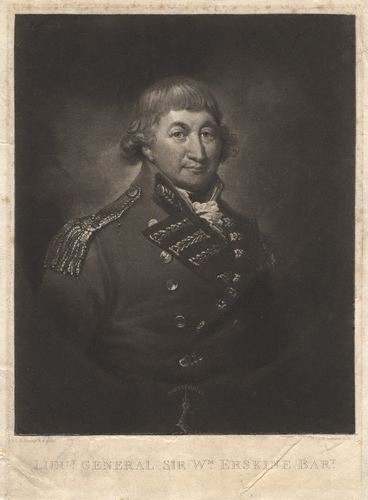
Lieutenant-General Sir William Erskine, 1st Baronet (1728 – 19 March 1795) was a British Army commander and the 1st Baronet of the Erskine of Torrie creation.
Lieutenant-General Sir William Erskine, 1st Baronet (1728 – 19 March 1795) was a British Army commander and the 1st Baronet of the Erskine of Torrie creation.
Remainder of article:
https://en.wikipedia.org/wiki/Sir_Wil...
Source: Wikipedia

Lieutenant-General Sir William Erskine, 1st Baronet (1728 – 19 March 1795) was a British Army commander and the 1st Baronet of the Erskine of Torrie creation.
Lieutenant-General Sir William Erskine, 1st Baronet (1728 – 19 March 1795) was a British Army commander and the 1st Baronet of the Erskine of Torrie creation.
Remainder of article:
https://en.wikipedia.org/wiki/Sir_Wil...
Source: Wikipedia
message 42:
by
Bentley, Group Founder, Leader, Chief
(last edited Jun 23, 2020 02:18AM)
(new)
-
rated it 4 stars
Commander in Chief - George Washington

This is the earliest authenticated portrait of George Washington. It shows him in the Virginia Regiment colonel’s uniform he wore during the French and Indian War. The painting hangs in the Washington and Lee University in Lexington, Virginia. It was painted by Charles Willson Peale in 1722. This is the earliest known depiction of Washington.
George Washington (February 22, 1732[1] – December 14, 1799) commanded the Continental Army in American Revolutionary War (1775–1783), and was the first President of the United States, serving from 1789 to 1797. Because of his central role in the founding of the United States, Washington is often called the "Father of his Country". His devotion to republicanism and civic virtue made him an exemplary figure among early American politicians.
Washington's military experience began in the French and Indian War with a commission as a major in the militia of the British Province of Virginia. In 1753 Washington was sent as an ambassador from the British crown to the French officials and Indians as far north as present-day Erie, Pennsylvania. The following year he led another expedition to the area to assist in the construction of a fort at present-day Pittsburgh, Pennsylvania. Before reaching that point, he and some of his men, accompanied by Indian allies, ambushed a French scouting party. Its leader was killed, although the exact circumstances of his death were disputed. This peacetime act of aggression is seen as one of the first military steps leading to the global Seven Years' War. The French responded by attacking fortifications Washington erected following the ambush, forcing his surrender. Released on parole, Washington and his troops returned to Virginia.
In 1755 he participated as a volunteer aide in the ill-fated expedition of General Edward Braddock, where he distinguished himself in the retreat following the climactic Battle of Monongahela. He served from 1755 until 1758 as colonel and commander of the Virginia Regiment, directing the provincial defenses against French and Indian raids and building the regiment into one of the best-trained provincial militias of the time. He led the regiment as part of the 1758 expedition of General John Forbes that successfully drove the French from Fort Duquesne, during which he and some of his companies were involved in a friendly fire incident. Unable to get a commission in the British Army, Washington then resigned from the provincial militia, married, and took up the life of a Virginia plantation owner.
Washington gained valuable military skills during the war, acquiring tactical, strategic, and logistical military experience. He also acquired important political skills in his dealings with the British military establishment and the provincial government. His military exploits, although they included some notable failures, made his military reputation in the colonies such that he became a natural selection as the commander in chief of the Continental Army following the outbreak of the American Revolutionary War in 1775. His successes in military and political spheres during that conflict led to his election as the first President of the United States of America.
Remainder of article:
https://en.wikipedia.org/wiki/George_...
More:
Internet Archive - Washington and his Generals
Link: https://archive.org/stream/washington...
Sources: Wikipedia, Internet Archive
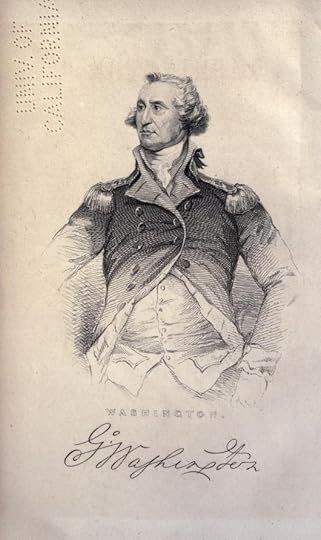

This is the earliest authenticated portrait of George Washington. It shows him in the Virginia Regiment colonel’s uniform he wore during the French and Indian War. The painting hangs in the Washington and Lee University in Lexington, Virginia. It was painted by Charles Willson Peale in 1722. This is the earliest known depiction of Washington.
George Washington (February 22, 1732[1] – December 14, 1799) commanded the Continental Army in American Revolutionary War (1775–1783), and was the first President of the United States, serving from 1789 to 1797. Because of his central role in the founding of the United States, Washington is often called the "Father of his Country". His devotion to republicanism and civic virtue made him an exemplary figure among early American politicians.
Washington's military experience began in the French and Indian War with a commission as a major in the militia of the British Province of Virginia. In 1753 Washington was sent as an ambassador from the British crown to the French officials and Indians as far north as present-day Erie, Pennsylvania. The following year he led another expedition to the area to assist in the construction of a fort at present-day Pittsburgh, Pennsylvania. Before reaching that point, he and some of his men, accompanied by Indian allies, ambushed a French scouting party. Its leader was killed, although the exact circumstances of his death were disputed. This peacetime act of aggression is seen as one of the first military steps leading to the global Seven Years' War. The French responded by attacking fortifications Washington erected following the ambush, forcing his surrender. Released on parole, Washington and his troops returned to Virginia.
In 1755 he participated as a volunteer aide in the ill-fated expedition of General Edward Braddock, where he distinguished himself in the retreat following the climactic Battle of Monongahela. He served from 1755 until 1758 as colonel and commander of the Virginia Regiment, directing the provincial defenses against French and Indian raids and building the regiment into one of the best-trained provincial militias of the time. He led the regiment as part of the 1758 expedition of General John Forbes that successfully drove the French from Fort Duquesne, during which he and some of his companies were involved in a friendly fire incident. Unable to get a commission in the British Army, Washington then resigned from the provincial militia, married, and took up the life of a Virginia plantation owner.
Washington gained valuable military skills during the war, acquiring tactical, strategic, and logistical military experience. He also acquired important political skills in his dealings with the British military establishment and the provincial government. His military exploits, although they included some notable failures, made his military reputation in the colonies such that he became a natural selection as the commander in chief of the Continental Army following the outbreak of the American Revolutionary War in 1775. His successes in military and political spheres during that conflict led to his election as the first President of the United States of America.
Remainder of article:
https://en.wikipedia.org/wiki/George_...
More:
Internet Archive - Washington and his Generals
Link: https://archive.org/stream/washington...
Sources: Wikipedia, Internet Archive

Landgraviate of Hesse-Kassel - Hessians
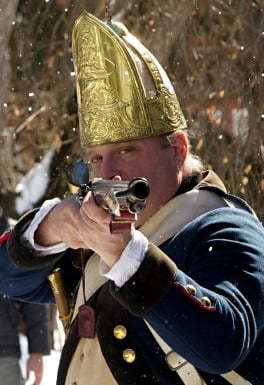
According to an old myth, General Washington met light resistance at the Battle of Trenton on the morning of December 26, 1776, because the town's Hessian defenders had been up late the night before celebrating Christmas. The story explains that the Patriots made quick work of the bumbling mercenaries besotted with holiday cheer. But the Hessian troops were hardly the hapless drunks of legend. Rather, they were generally excellent soldiers.
The term "Hessians" refers to the approximately 30,000 German troops hired by the British to help fight during the American Revolution. They were principally drawn from the German state of Hesse-Cassel, although soldiers from other German states also saw action in America. (At the time, Germany was not a unified country but a collection of individual states that shared a language and culture.)
Hiring a foreign army was not unusual in the eighteenth century. For Hesse-Cassel, soldiers were a major export. By renting its army to the British, Hesse-Cassel took in an amount equal to about thirteen years' worth of tax revenue. This allowed the state's prince, the Landgraf Friedrich II, to keep taxes low and public spending high. A man of the Enlightenment, Friedrich oversaw public works projects, administered a public welfare system, and encouraged education.
Even so, military needs dominated the country. When boys turned seven they were registered for military service, and each year men ages sixteen to thirty had to present themselves to an official for possible induction. Some men were exempted because their occupations were considered vital to the state. But others, such as school dropouts, bankrupts, servants without masters, idlers, and the unemployed, were deemed "expendable people" and could be forced into service at any time.
Life in the Hessian Army was harsh. The system aimed to instill iron discipline and the punishments could be brutal. Still, morale was generally high. Officers were well-educated, promotion was by merit, and soldiers took pride in serving their prince and their people. Furthermore, military service provided economic benefits. The families of soldiers were exempt from certain taxes, wages were higher than in farm work, and there was the promise of booty (money earned through the sale of captured military property) and plunder (property taken from civilians). Officially plunder was verboten (forbidden), but officers, who also had a taste for looted goods, often looked the other way.
The penchant for plunder made the Hessians unpopular with Americans. The Declaration of Independence, for example, condemned the king for "transporting large Armies of foreign Mercenaries to compleat the works of death, desolation and tyranny, already begun with circumstances of Cruelty & perfidy scarcely paralleled in the most barbarous ages, and totally unworthy the Head of a civilized nation."1 During the war, Hessian plundering often pushed neutral or indifferent Americans to the Patriot side.
In spite of such hostility, some 3,000 Hessians decided they liked the country well enough to make it their new home after the war, and they declined returning to Europe. In America, they lived side by side—and perhaps shared a Christmas drink—with their former foes.
Source: Mount Vernon - David Head, Ph.D.

According to an old myth, General Washington met light resistance at the Battle of Trenton on the morning of December 26, 1776, because the town's Hessian defenders had been up late the night before celebrating Christmas. The story explains that the Patriots made quick work of the bumbling mercenaries besotted with holiday cheer. But the Hessian troops were hardly the hapless drunks of legend. Rather, they were generally excellent soldiers.
The term "Hessians" refers to the approximately 30,000 German troops hired by the British to help fight during the American Revolution. They were principally drawn from the German state of Hesse-Cassel, although soldiers from other German states also saw action in America. (At the time, Germany was not a unified country but a collection of individual states that shared a language and culture.)
Hiring a foreign army was not unusual in the eighteenth century. For Hesse-Cassel, soldiers were a major export. By renting its army to the British, Hesse-Cassel took in an amount equal to about thirteen years' worth of tax revenue. This allowed the state's prince, the Landgraf Friedrich II, to keep taxes low and public spending high. A man of the Enlightenment, Friedrich oversaw public works projects, administered a public welfare system, and encouraged education.
Even so, military needs dominated the country. When boys turned seven they were registered for military service, and each year men ages sixteen to thirty had to present themselves to an official for possible induction. Some men were exempted because their occupations were considered vital to the state. But others, such as school dropouts, bankrupts, servants without masters, idlers, and the unemployed, were deemed "expendable people" and could be forced into service at any time.
Life in the Hessian Army was harsh. The system aimed to instill iron discipline and the punishments could be brutal. Still, morale was generally high. Officers were well-educated, promotion was by merit, and soldiers took pride in serving their prince and their people. Furthermore, military service provided economic benefits. The families of soldiers were exempt from certain taxes, wages were higher than in farm work, and there was the promise of booty (money earned through the sale of captured military property) and plunder (property taken from civilians). Officially plunder was verboten (forbidden), but officers, who also had a taste for looted goods, often looked the other way.
The penchant for plunder made the Hessians unpopular with Americans. The Declaration of Independence, for example, condemned the king for "transporting large Armies of foreign Mercenaries to compleat the works of death, desolation and tyranny, already begun with circumstances of Cruelty & perfidy scarcely paralleled in the most barbarous ages, and totally unworthy the Head of a civilized nation."1 During the war, Hessian plundering often pushed neutral or indifferent Americans to the Patriot side.
In spite of such hostility, some 3,000 Hessians decided they liked the country well enough to make it their new home after the war, and they declined returning to Europe. In America, they lived side by side—and perhaps shared a Christmas drink—with their former foes.
Source: Mount Vernon - David Head, Ph.D.
Charles Mawhood
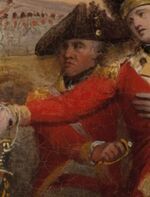
Lt. Col. Charles Mawhood (23 December 1729 – 29 August 1780) was a British army officer during the 18th century, most noted for his command during the Battle of Princeton.
Remainder of article:
https://en.wikipedia.org/wiki/Charles...
Source: Wikipedia

Lt. Col. Charles Mawhood (23 December 1729 – 29 August 1780) was a British army officer during the 18th century, most noted for his command during the Battle of Princeton.
Remainder of article:
https://en.wikipedia.org/wiki/Charles...
Source: Wikipedia
message 45:
by
Bentley, Group Founder, Leader, Chief
(last edited Jun 23, 2020 01:45AM)
(new)
-
rated it 4 stars
General William Alexander (Lord Stirling)
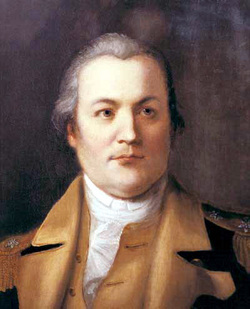
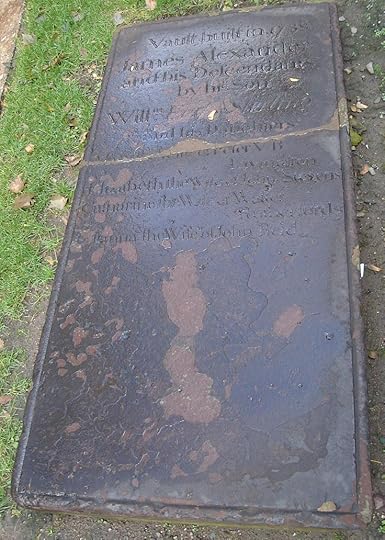
Born in 1726 in New York City, William Alexander was the son of James and Mary Alexander. From a well-to-do family, Alexander proved a good student with an aptitude for astronomy and mathematics. Completing his schooling, he partnered with his mother in a provisioning business and proved a gifted trader. In 1747, Alexander married Sarah Livingston who was the daughter of the wealthy New York merchant Philip Livingston. With the beginning of the French & Indian War in 1754, he commenced service as a provisioning agent for the British Army. In this role, Alexander cultivated close ties to the Governor of Massachusetts, William Shirley.
When Shirley ascended to the post of commander-in-chief of British forces in North America following the death of Major General Edward Braddock at the Battle of the Monongahela in July 1755, he selected Alexander as one of his aide de camps. In this role, he met and befriended many of the elites in colonial society including George Washington. Following Shirley's relief in late 1756, Alexander traveled to Britain to lobby on his former commander's behalf. While abroad, he learned that the seat of the Earl of Stirling lay vacant. Possessing family ties to the area, Alexander began pursuing a claim to the earldom and commenced styling himself Lord Stirling. Though Parliament later declined his claim in 1767, he continued to use the title.
Returning Home to the Colonies
Returning to the colonies, Stirling resumed his business activities and began building an estate in Basking Ridge, NJ. Though he received a large inheritance from his father, his desire to live and entertain like nobility often put him into debt. In addition to business, Stirling pursued mining and various forms of agriculture. His efforts at the latter saw him win a gold medal from the Royal Society of Art in 1767 for his attempts to commence winemaking in New Jersey. As the 1760s passed, Stirling became increasingly displeased with British policy towards the colonies. This change in politics moved him firmly into the Patriot camp when the American Revolution began in 1775 following the Battles of Lexington and Concord.
The Fighting Begins
Quickly appointed a colonel in the New Jersey militia, Stirling frequently used his own fortune to equip and outfit his men. On January 22, 1776, he gained notoriety when he led a volunteer force in capturing the British transport Blue Mountain Valley which had grounded off Sandy Hook. Ordered to New York City by Major General Charles Lee shortly thereafter, he aided constructing defenses in the area and received a promotion to brigadier general in the Continental Army on March 1. With the successful end of the Siege of Boston later that month, Washington, now leading American forces, began moving his troops south to New York. As the army grew and reorganized through the summer, Stirling assumed command of a brigade in Major General John Sullivan's division which included troops from Maryland, Delaware, and Pennsylvania.
The Battle of Long Island
In July, British forces led by General Sir William Howe and his brother, Vice Admiral Richard Howe, began arriving off New York. Late the following month, the British commenced landing on Long Island. To block this movement, Washington deployed part of his army along the Guan Heights which ran east-west through the middle of the island. This saw Stirling's men form the right flank of the army as they held the westernmost part of the heights. Having thoroughly scouted the area, Howe discovered a gap in the heights to east at Jamaica Pass which was lightly defended. On August 27, he directed Major General James Grant to make a diversionary attack against the American right while the bulk of the army moved through Jamaica Pass and into the enemy's rear.
As the Battle of Long Island commenced, Stirling's men repeatedly turned back British and Hessian assaults on their position. Holding for four hours, his troops believed they were winning the engagement as they were unaware that Howe's flanking force had begun rolling up the American left.
Around 11:00 AM, Stirling was compelled to begin falling back and was shocked to see British forces advancing to his left and rear. Ordering the bulk of his command to withdraw over Gowanus Creek to the final defensive line on Brooklyn Heights, Stirling and Major Mordecai Gist led a force of 260–270 Marylanders in a desperate rearguard action to cover the retreat. Twice attacking a force of over 2,000 men, this group succeeded delaying the enemy. In the fighting, all but a few were killed and Stirling was captured.
Sources: Wikipedia, Find a Grave


Born in 1726 in New York City, William Alexander was the son of James and Mary Alexander. From a well-to-do family, Alexander proved a good student with an aptitude for astronomy and mathematics. Completing his schooling, he partnered with his mother in a provisioning business and proved a gifted trader. In 1747, Alexander married Sarah Livingston who was the daughter of the wealthy New York merchant Philip Livingston. With the beginning of the French & Indian War in 1754, he commenced service as a provisioning agent for the British Army. In this role, Alexander cultivated close ties to the Governor of Massachusetts, William Shirley.
When Shirley ascended to the post of commander-in-chief of British forces in North America following the death of Major General Edward Braddock at the Battle of the Monongahela in July 1755, he selected Alexander as one of his aide de camps. In this role, he met and befriended many of the elites in colonial society including George Washington. Following Shirley's relief in late 1756, Alexander traveled to Britain to lobby on his former commander's behalf. While abroad, he learned that the seat of the Earl of Stirling lay vacant. Possessing family ties to the area, Alexander began pursuing a claim to the earldom and commenced styling himself Lord Stirling. Though Parliament later declined his claim in 1767, he continued to use the title.
Returning Home to the Colonies
Returning to the colonies, Stirling resumed his business activities and began building an estate in Basking Ridge, NJ. Though he received a large inheritance from his father, his desire to live and entertain like nobility often put him into debt. In addition to business, Stirling pursued mining and various forms of agriculture. His efforts at the latter saw him win a gold medal from the Royal Society of Art in 1767 for his attempts to commence winemaking in New Jersey. As the 1760s passed, Stirling became increasingly displeased with British policy towards the colonies. This change in politics moved him firmly into the Patriot camp when the American Revolution began in 1775 following the Battles of Lexington and Concord.
The Fighting Begins
Quickly appointed a colonel in the New Jersey militia, Stirling frequently used his own fortune to equip and outfit his men. On January 22, 1776, he gained notoriety when he led a volunteer force in capturing the British transport Blue Mountain Valley which had grounded off Sandy Hook. Ordered to New York City by Major General Charles Lee shortly thereafter, he aided constructing defenses in the area and received a promotion to brigadier general in the Continental Army on March 1. With the successful end of the Siege of Boston later that month, Washington, now leading American forces, began moving his troops south to New York. As the army grew and reorganized through the summer, Stirling assumed command of a brigade in Major General John Sullivan's division which included troops from Maryland, Delaware, and Pennsylvania.
The Battle of Long Island
In July, British forces led by General Sir William Howe and his brother, Vice Admiral Richard Howe, began arriving off New York. Late the following month, the British commenced landing on Long Island. To block this movement, Washington deployed part of his army along the Guan Heights which ran east-west through the middle of the island. This saw Stirling's men form the right flank of the army as they held the westernmost part of the heights. Having thoroughly scouted the area, Howe discovered a gap in the heights to east at Jamaica Pass which was lightly defended. On August 27, he directed Major General James Grant to make a diversionary attack against the American right while the bulk of the army moved through Jamaica Pass and into the enemy's rear.
As the Battle of Long Island commenced, Stirling's men repeatedly turned back British and Hessian assaults on their position. Holding for four hours, his troops believed they were winning the engagement as they were unaware that Howe's flanking force had begun rolling up the American left.
Around 11:00 AM, Stirling was compelled to begin falling back and was shocked to see British forces advancing to his left and rear. Ordering the bulk of his command to withdraw over Gowanus Creek to the final defensive line on Brooklyn Heights, Stirling and Major Mordecai Gist led a force of 260–270 Marylanders in a desperate rearguard action to cover the retreat. Twice attacking a force of over 2,000 men, this group succeeded delaying the enemy. In the fighting, all but a few were killed and Stirling was captured.
Sources: Wikipedia, Find a Grave
Henry Knox
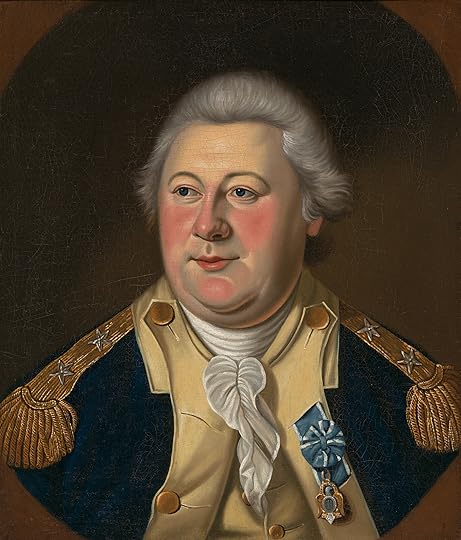
An overweight Boston bookseller who demonstrated a genius for military engineering and gunnery, Henry Knox—shown here in a major general’s uniform—soon commanded the Continental artillery. Washington would say of him, “[There was] no one whom I have loved more sincerely.” - Charles Peale Polk, copy after Charles Willson Peale, Henry Knox, oil on canvas, after 1783. (Courtesy National Portrait Gallery, Smithsonian Institution)

An overweight Boston bookseller who demonstrated a genius for military engineering and gunnery, Henry Knox—shown here in a major general’s uniform—soon commanded the Continental artillery. Washington would say of him, “[There was] no one whom I have loved more sincerely.” - Charles Peale Polk, copy after Charles Willson Peale, Henry Knox, oil on canvas, after 1783. (Courtesy National Portrait Gallery, Smithsonian Institution)
message 47:
by
Bentley, Group Founder, Leader, Chief
(last edited Jun 23, 2020 01:51AM)
(new)
-
rated it 4 stars
Brigadier General Thomas Mifflin
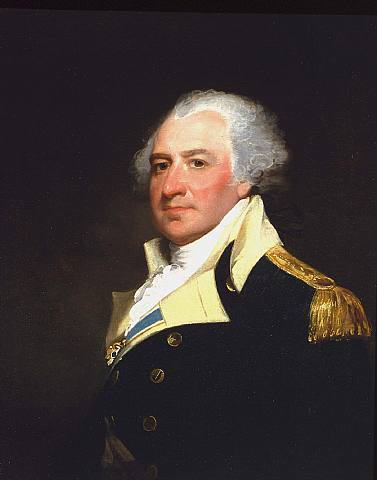
Thomas Mifflin was a distinguished merchant and politician from Pennsylvania who also served as a delegate and President of the Continental Congress, major general in the Continental Army, delegate to the Constitutional Convention, and first governor of the commonwealth of Pennsylvania. Despite these varied accomplishments, Mifflin is also known for his involvement in scandals as the first Quartermaster General of the Continental Army that tarnished his reputation and led to a falling out with George Washington.
Mifflin was born in Philadelphia in 1744, the son of wealthy Quaker merchants. He attended the College of Philadelphia (the future University of Pennsylvania) and four years after graduating opened a trading shop in the city with his brother. By 1769, Mifflin became involved in the colonial resistance against British policies. In 1772, he was elected to serve in the Pennsylvania Provincial Assembly, where he advocated for revolt against Great Britain. In 1774 and again in 1775, he was chosen as a delegate to the Continental Congress and ultimately supported the move toward independence.
Mifflin joined the Continental Army in April 1775, following the Battles of Lexington and Concord. On July 4, 1775, General George Washington announced in his General Orders that "Thomas Mifflin Esqr. is appointed by the Gen[eral] one of his Aid-de-Camps."1 Mifflin held the rank of Major and was mainly involved in writing messages, reports, and orders for Washington. After serving as an aide-de-camp for just over a month, Mifflin received Washington's appointment to become the Quartermaster General for the Continental Army.
Many soldiers and civilians praised the selection, including Richard Henry Lee, who wrote to Washington: "I think you could not possible have appointed a better Man to his present Office than Mr. Mifflin."2 Mifflin commanded the Quartermaster Department, overseeing the distribution of clothing and equipment to the soldiers of the Continental Army and was promoted to the rank of Colonel on December 22, 1775, to Brigadier General on May 16, 1776, and to Major General on February 19, 1777.
During his time as Quartermaster General, however, Mifflin came under intense scrutiny for his poor handling of the Department, particularly its financial affairs. On March 7, 1776, Washington's secretary, Lieutenant Colonel Joseph Reed, wrote to his commander: "I ought to mention to you a Continuance of one of your principal Officers in a private Trade with which I remember you was much dissatisfied last Fall- you can be at no Loss to know who I mean [Mifflin]."3 This accusation was just one of many made by soldiers and civilians alike against Mifflin.
By the spring of 1777, Mifflin also began to disagree with Washington's war strategy. Mifflin temporarily resigned as Quartermaster General during the summer, but remained in the Army. He then became aligned with members of the so-called Conway Cabal, a plot to replace Washington with Horatio Gates as Commander-in-Chief. Understandably, tensions between Washington and Mifflin emerged. Mifflin briefly returned to the post of Quartermaster later that year. However, on June 11, 1778, a letter from the President of the Continental Congress directed "an enquiry to be made into the conduct of the late Quarter Master general."4 Washington allowed Mifflin to leave the Army and attend to his defense. Mifflin continued to be inundated by allegations of his misconduct until finally resigning his commission in February 1779.
Mifflin returned to Pennsylvania following his military service. He served once again as a delegate to the Continental Congress and was elected its President in 1783. While in this position, he personally accepted Washington's resignation as Commander-in-Chief. Mifflin served as a member of the Constitutional Convention in 1787 and then as President of the Supreme Executive Council of Pennsylvania. In 1790, he was elected the first Governor of the Commonwealth. Washington and Mifflin remained in contact throughout this period, but primarily to conduct official business while Mifflin served as Governor. Mifflin served in that office for nine years before he died in Lancaster on January 20, 1800.
Source: Mount Vernon - Jared D. Johnson - George Washington University

Thomas Mifflin was a distinguished merchant and politician from Pennsylvania who also served as a delegate and President of the Continental Congress, major general in the Continental Army, delegate to the Constitutional Convention, and first governor of the commonwealth of Pennsylvania. Despite these varied accomplishments, Mifflin is also known for his involvement in scandals as the first Quartermaster General of the Continental Army that tarnished his reputation and led to a falling out with George Washington.
Mifflin was born in Philadelphia in 1744, the son of wealthy Quaker merchants. He attended the College of Philadelphia (the future University of Pennsylvania) and four years after graduating opened a trading shop in the city with his brother. By 1769, Mifflin became involved in the colonial resistance against British policies. In 1772, he was elected to serve in the Pennsylvania Provincial Assembly, where he advocated for revolt against Great Britain. In 1774 and again in 1775, he was chosen as a delegate to the Continental Congress and ultimately supported the move toward independence.
Mifflin joined the Continental Army in April 1775, following the Battles of Lexington and Concord. On July 4, 1775, General George Washington announced in his General Orders that "Thomas Mifflin Esqr. is appointed by the Gen[eral] one of his Aid-de-Camps."1 Mifflin held the rank of Major and was mainly involved in writing messages, reports, and orders for Washington. After serving as an aide-de-camp for just over a month, Mifflin received Washington's appointment to become the Quartermaster General for the Continental Army.
Many soldiers and civilians praised the selection, including Richard Henry Lee, who wrote to Washington: "I think you could not possible have appointed a better Man to his present Office than Mr. Mifflin."2 Mifflin commanded the Quartermaster Department, overseeing the distribution of clothing and equipment to the soldiers of the Continental Army and was promoted to the rank of Colonel on December 22, 1775, to Brigadier General on May 16, 1776, and to Major General on February 19, 1777.
During his time as Quartermaster General, however, Mifflin came under intense scrutiny for his poor handling of the Department, particularly its financial affairs. On March 7, 1776, Washington's secretary, Lieutenant Colonel Joseph Reed, wrote to his commander: "I ought to mention to you a Continuance of one of your principal Officers in a private Trade with which I remember you was much dissatisfied last Fall- you can be at no Loss to know who I mean [Mifflin]."3 This accusation was just one of many made by soldiers and civilians alike against Mifflin.
By the spring of 1777, Mifflin also began to disagree with Washington's war strategy. Mifflin temporarily resigned as Quartermaster General during the summer, but remained in the Army. He then became aligned with members of the so-called Conway Cabal, a plot to replace Washington with Horatio Gates as Commander-in-Chief. Understandably, tensions between Washington and Mifflin emerged. Mifflin briefly returned to the post of Quartermaster later that year. However, on June 11, 1778, a letter from the President of the Continental Congress directed "an enquiry to be made into the conduct of the late Quarter Master general."4 Washington allowed Mifflin to leave the Army and attend to his defense. Mifflin continued to be inundated by allegations of his misconduct until finally resigning his commission in February 1779.
Mifflin returned to Pennsylvania following his military service. He served once again as a delegate to the Continental Congress and was elected its President in 1783. While in this position, he personally accepted Washington's resignation as Commander-in-Chief. Mifflin served as a member of the Constitutional Convention in 1787 and then as President of the Supreme Executive Council of Pennsylvania. In 1790, he was elected the first Governor of the Commonwealth. Washington and Mifflin remained in contact throughout this period, but primarily to conduct official business while Mifflin served as Governor. Mifflin served in that office for nine years before he died in Lancaster on January 20, 1800.
Source: Mount Vernon - Jared D. Johnson - George Washington University
message 48:
by
Bentley, Group Founder, Leader, Chief
(last edited Jul 06, 2020 04:34PM)
(new)
-
rated it 4 stars
And so we begin:
Chapter 16.
A Sentimental Manner of Making War
NEW YORK, SEPTEMBER 1776
"Oarsmen draped in dark cloaks took their seats on the thwarts of two whaleboats just before midnight on Friday, September 6. Not for another hour would the crescent moon rise, and dim starlight blued the stubby dock jutting from Whitehall Battery, on Manhattan’s southern tip. From the stern of each boat a trailing rope had been lashed to a vessel shaped like an upright barrel and described by one rebel soldier as “a machine altogether different from anything hitherto devised by the art of man.”
A sinewy Connecticut sergeant named Ezra Lee lowered himself into the contraption through a narrow opening and pulled shut the brass hatch. On order, the oarsmen stroked away from the shoreline, towing Sergeant Lee behind them as they headed toward Bedloe’s Island, two miles southwest.
Hundreds of silhouetted masts and yardarms could be seen poking the stars in the British anchorage. The clang of ships’ bells carried across the Upper Bay. Dead ahead loomed the largest and newest of the enemy men-of-war, the sixty-four-gun Eagle, moored just off Bedloe’s near the New Jersey shore with a crew of more than six hundred men.
After a few final strokes, the rowers shipped their oars, cast off the ropes, and swung back to Manhattan, leaving Sergeant Lee to submerge in his odd vessel—the Turtle—with the intent of blowing Admiral Howe’s flagship out of the water.
Source: Atkinson, Rick. The British Are Coming (The Revolution Trilogy) (p. 380). Henry Holt and Co.. Kindle Edition.
Discussion Topics and Questions:
1. What were your thoughts about "the Turtle"? Was this an effective plan?
2. How formidable was "Black Dick"? Admiral Howe was General Howe's brother who fought at the battle at Quiberon which proved to be the greatest English sea victory since Drake’s day, a triumph that confirmed Britain as a world power. “Give us Black Dick,” his sailors boasted, “and we fear nothing.”
3. How does the author describe Admiral Howe and what would you consider his strengths and weaknesses? Atkinson mentions that both Howe brothers were sympathetic to the Americans in that they were hoping for a reconciliation with the crown. Could that have been a factor in some of their decisions?
4. Both of the Howe brothers were appointed to be peace commissioners and then Lord Germaine tied both of their hands behind their backs. Why was Lord Germaine so hostile towards the Americans? How did the British think the Howe brothers were going to be successful when the terms established had no wiggle room and the Howes were not really empowered?
5. Admiral Howe hosted dinners on the Eagle with Stirling and Sullivan and expressed his gratitude at how compassionate New Englanders were when his older brother was killed at Fort Carillon. Could that have been one of the reasons that the General Howe appeared hesitant in Massachusetts earlier? Were the Howe brothers sympathetic to the Americans for other reasons like the Fort Carillon event? Or was Howe sympathetic because he knew Benjamin Franklin very well since Howe's sister Caroline had been Franklin's chess partner? Why did the peace negotiation not go as well as Howe hoped?
6. Why did Washington not burn New York as Greene suggested despite what Congress stated? Was Congress micromanaging the war? Why was Greene appalled at Washington's initial decisions? How then did the fire start that burned a portion of New York?
7. Washington was not having success in New York and suffered another defeat at Kip's Bay. What are your thoughts regarding this subsequent defeat after Long Island. How did the skirmish at Harlem Heights restore some confidence in Washington's troops? Was John Adams correct that the Americans were out generaled? Why or why not? Was Washington's inexperience showing?
8. Nathan Hale is at the wrong place at the wrong time and is executed? How is he remembered today?
Source: Atkinson, Rick. The British Are Coming (The Revolution Trilogy) (p. 383). Henry Holt and Co.. Kindle Edition.
Chapter 16.
A Sentimental Manner of Making War
NEW YORK, SEPTEMBER 1776
"Oarsmen draped in dark cloaks took their seats on the thwarts of two whaleboats just before midnight on Friday, September 6. Not for another hour would the crescent moon rise, and dim starlight blued the stubby dock jutting from Whitehall Battery, on Manhattan’s southern tip. From the stern of each boat a trailing rope had been lashed to a vessel shaped like an upright barrel and described by one rebel soldier as “a machine altogether different from anything hitherto devised by the art of man.”
A sinewy Connecticut sergeant named Ezra Lee lowered himself into the contraption through a narrow opening and pulled shut the brass hatch. On order, the oarsmen stroked away from the shoreline, towing Sergeant Lee behind them as they headed toward Bedloe’s Island, two miles southwest.
Hundreds of silhouetted masts and yardarms could be seen poking the stars in the British anchorage. The clang of ships’ bells carried across the Upper Bay. Dead ahead loomed the largest and newest of the enemy men-of-war, the sixty-four-gun Eagle, moored just off Bedloe’s near the New Jersey shore with a crew of more than six hundred men.
After a few final strokes, the rowers shipped their oars, cast off the ropes, and swung back to Manhattan, leaving Sergeant Lee to submerge in his odd vessel—the Turtle—with the intent of blowing Admiral Howe’s flagship out of the water.
Source: Atkinson, Rick. The British Are Coming (The Revolution Trilogy) (p. 380). Henry Holt and Co.. Kindle Edition.
Discussion Topics and Questions:
1. What were your thoughts about "the Turtle"? Was this an effective plan?
2. How formidable was "Black Dick"? Admiral Howe was General Howe's brother who fought at the battle at Quiberon which proved to be the greatest English sea victory since Drake’s day, a triumph that confirmed Britain as a world power. “Give us Black Dick,” his sailors boasted, “and we fear nothing.”
3. How does the author describe Admiral Howe and what would you consider his strengths and weaknesses? Atkinson mentions that both Howe brothers were sympathetic to the Americans in that they were hoping for a reconciliation with the crown. Could that have been a factor in some of their decisions?
4. Both of the Howe brothers were appointed to be peace commissioners and then Lord Germaine tied both of their hands behind their backs. Why was Lord Germaine so hostile towards the Americans? How did the British think the Howe brothers were going to be successful when the terms established had no wiggle room and the Howes were not really empowered?
5. Admiral Howe hosted dinners on the Eagle with Stirling and Sullivan and expressed his gratitude at how compassionate New Englanders were when his older brother was killed at Fort Carillon. Could that have been one of the reasons that the General Howe appeared hesitant in Massachusetts earlier? Were the Howe brothers sympathetic to the Americans for other reasons like the Fort Carillon event? Or was Howe sympathetic because he knew Benjamin Franklin very well since Howe's sister Caroline had been Franklin's chess partner? Why did the peace negotiation not go as well as Howe hoped?
6. Why did Washington not burn New York as Greene suggested despite what Congress stated? Was Congress micromanaging the war? Why was Greene appalled at Washington's initial decisions? How then did the fire start that burned a portion of New York?
7. Washington was not having success in New York and suffered another defeat at Kip's Bay. What are your thoughts regarding this subsequent defeat after Long Island. How did the skirmish at Harlem Heights restore some confidence in Washington's troops? Was John Adams correct that the Americans were out generaled? Why or why not? Was Washington's inexperience showing?
8. Nathan Hale is at the wrong place at the wrong time and is executed? How is he remembered today?
Source: Atkinson, Rick. The British Are Coming (The Revolution Trilogy) (p. 383). Henry Holt and Co.. Kindle Edition.
Books mentioned in this topic
A Guide to the Battles of the American Revolution (other topics)The War of the Revolution, 2 Vols in 1 (other topics)
The Battle for New York: The City at the Heart of the American Revolution (other topics)
A Narrative of a Revolutionary Soldier: Some Adventures, Dangers, and Sufferings of Joseph Plumb Martin (other topics)
Washington's Crossing (other topics)
More...
Authors mentioned in this topic
Theodore P. Savas (other topics)Christopher Ward (other topics)
Barnet Schecter (other topics)
Joseph Plumb Martin (other topics)
David Hackett Fischer (other topics)
More...







Rick Atkinson.
Hello Everyone,
For the week of June 22nd - June 28th, we are reading approximately Chapters Fifteen and Sixteen.
The seventh week's reading assignment is:
(June 22nd - June 28th)
Week Seven: -(June 22nd - June 28th, 2020) (page 348 - 402)
15. A FIGHT AMONG WOLVES
New York, July–August 1776 - page 348
16. A SENTIMENTAL MANNER OF MAKING WAR
New York, September 1776 - page 380
We will open up a thread for each week's reading. Please make sure to post in the particular thread dedicated to those specific chapters and page numbers to avoid spoilers. We will also open up supplemental threads as we did for other spotlighted books.
This book was kicked off May 10th
We look forward to your participation. Amazon, Barnes and Noble, other noted on line booksellers do have copies of the book and shipment can be expedited. The book can also be obtained easily at your local library, or on your Kindle.
There is no rush and we are thrilled to have you join us. It is never too late to get started and/or to post.
Bentley will be moderating this selection. And Lorna will be my backup.
Welcome,
~Bentley
TO ALWAYS SEE ALL WEEKS' THREADS SELECT VIEW ALL
REMEMBER NO SPOILERS ON THE WEEKLY NON SPOILER THREADS - ON EACH WEEKLY NON SPOILER THREAD - WE ONLY DISCUSS THE PAGES ASSIGNED OR THE PAGES WHICH WERE COVERED IN PREVIOUS WEEKS. IF YOU GO AHEAD OR WANT TO ENGAGE IN MORE EXPANSIVE DISCUSSION - POST THOSE COMMENTS IN ONE OF THE SPOILER THREADS. THESE CHAPTERS HAVE A LOT OF INFORMATION SO WHEN IN DOUBT CHECK WITH THE CHAPTER OVERVIEW AND SUMMARY TO RECALL WHETHER YOUR COMMENTS ARE ASSIGNMENT SPECIFIC. EXAMPLES OF SPOILER THREADS ARE THE GLOSSARY, THE BIBLIOGRAPHY, THE INTRODUCTION AND THE BOOK AS A WHOLE THREADS.
Notes:
It is always a tremendous help when you quote specifically from the book itself and reference the chapter and page numbers when responding. The text itself helps folks know what you are referencing and makes things clear.
Citations:
If an author or book is mentioned other than the book and author being discussed, citations must be included according to our guidelines. Also, when citing other sources, please provide credit where credit is due and/or the link. There is no need to re-cite the author and the book we are discussing however.
Here is the link to the thread titled Mechanics of the Board which will help you with the citations and how to do them.
http://www.goodreads.com/topic/show/2...
Also, the citation thread: (for Unreasonable Men - look at examples)
https://www.goodreads.com/topic/show/...
Introduction Thread:
https://www.goodreads.com/topic/show/...
Table of Contents and Syllabus
https://www.goodreads.com/topic/show/...
Glossary
Remember there is a glossary thread where ancillary information is placed by the moderator. This is also a thread where additional information can be placed by the group members regarding the subject matter being discussed. In the case of this book we have two glossaries which are brought over from other selections (same timeframe) that we will add to.
Here are the links:
https://www.goodreads.com/topic/show/...
https://www.goodreads.com/topic/show/...
Bibliography
There is a Bibliography where books cited in the text are posted with proper citations and reviews. We also post the books that the author may have used in his research or in his notes. Please also feel free to add to the Bibliography thread any related books, etc with proper citations or other books either non fiction or historical fiction that relate to the subject matter of the book itself. In the case of this book, Rick Atkinson's primary sources start on page 703.
No self promotion, please.
Here is the link:
https://www.goodreads.com/topic/show/...
Book as a Whole and Final Thoughts - Spoiler Thread
Here is the link:
https://www.goodreads.com/topic/show/...